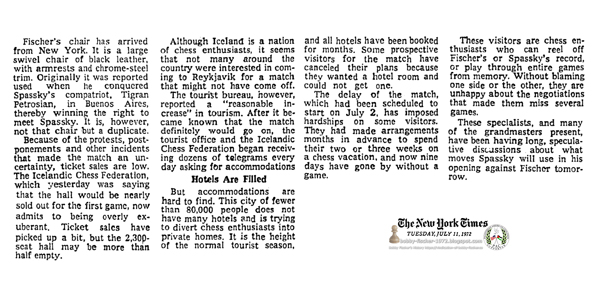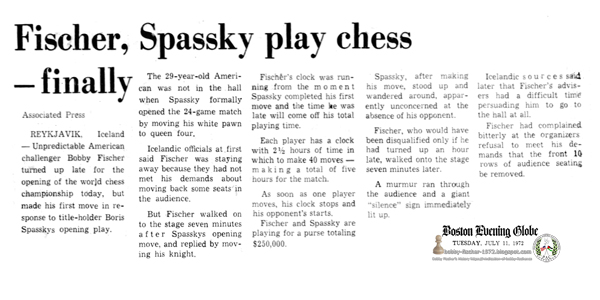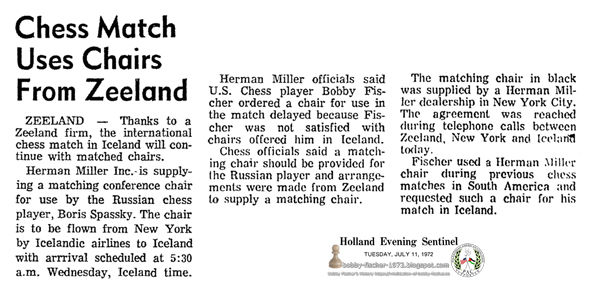New York Times, New York, New York, Tuesday, July 11, 1972 - Page 32
Play May Be Televised
Bobby Fischer-Boris Spassky match will be covered on television by W.N.E.T. Channel 13 and by the Teleprompter Corporation on Cable Channel 10, barring legal troubles.
Both channels have been planning to re-create the play in Reykjavik, Iceland, by having a chess expert in a local studio make the moves on a large board, using move-by-move information from the wires of The Associated Press.
However, the Chester Fox Corporation, the organization that has a contract for exclusive television rights to the chess match, has threatened the two stations with legal action ([the Soviet hand as predicted by Fischer, to bury coverage of the match in Iceland which didn't even possess satellite communications…this obstruction to free press was one of the issues raised by Bobby Fischer's lawyer during his “holdout”]) if they broadcast running, move-by-move reports of the match. Fox has also told The Associated Press that it would attempt to limit the number of moves the news service may put on its wire during a given time.
In any event, as of yesterday, both Channel 13 and Channel 10 planned to begin broadcasts of the first game beginning at 1 P.M. today.
For Channel 13, Shelby Lyman, a chess master, will re-create the play on a board in WNET's studios and offer commentary on the game in progress and each player's performance. A similar job will be done on cable TV by Arthur Bisguier, an international grandmaster.
The American Broadcasting Company announced yesterday that it would present a one-hour special Sunday at 5 P.M. as part of its coverage of the 24-game match. The network acquired exclusive television rights to the match through Chester Fox for an undisclosed sum.
Using films and videotapes made in Reykjavik, AC will show the actual first two games, which are to be played today and Thursday, with analyses of key moves and strategy by Larry Evans, a grandmaster. ([Says the LA Times regarding Larry Evans: Fischer “imposed conditions that were unacceptable,” Evans told the World Chess Network in 2004. “Like I couldn't write about his matches” Good! That's because nearly everything you wrote about Fischer in 1972 and thereafter, amounted to slander dreamed up in the imaginative mind of a disgruntled man, not a professional journalist, Knowing Larry Evans will appear before America as a narrator for Wide World of Sports on AC would be good deterrent to feeling of any further obligation with the Soviet-Chester Fox sham!])
Originally, the first games were to have been shown on A.B.C.'s regular “Wide World of Sports” program last Saturday, but the postponements prevented that. The network has contracted for footage to be used on “Wide World of Sports” for a maximum of eight weeks.
New York Times, New York, New York, Tuesday, July 11, 1972 - Page 32
Chess Champions Poised for Match by Harold C. Schonberg
Reykjavik, Iceland, July 10—Bobby Fischer and Boris Spassky, like two high-strung athletes—which in a way they are—tapered off their training today and are ready to face each other tomorrow for the chess championship of the world.
The match is to begin at 5 P.M.—1 P.M. New York time—in Exhibition Hall. Spassky, the titleholder, will play white, and thus has the first move in the first game.
The 35-year-old Soviet star, who has been world champion since 1969, played tennis this morning and then disappeared from public view. His 29-year-old American challenger swam last night and, as is his custom, slept through most of the day.
Spassky was reported tense but confident. He is more volatile than Fischer, and it was said that he was undergoing a last-minute bout of nerves. Fischer was reported relaxed and happy.
In a way the match resembles a prizefight. Each player has long been in training for the event, which carries a purse of $250,000, the winner to get five-eighths, and both are surrounded by trainers and advisers.
Russians Visit Arena
The two sides have also been disputing for months about contractual agreements, with negotiations that were settled only last week. And both will make money from film and television coverage.
The match is being held in a sports arena and Lloyd's of London has established betting odds on the match, making Fischer an odds-on favorite.
It is a match that has attracted worldwide interest, and it has international overtones. Neither player is politically oriented‐Spassky is not even a member of the Communist party—but the match nevertheless has developed into something of a Russian-American confrontation.
The Union of Soviet Socialist Republics has held the chess championship since 1948, when Mikhail Botvinnik won the title, and has politicized chess as much as it has politicized drama, art and music. The Soviet public has been told that Soviet chess is supreme because it reflects Marxist-Leninist ideals. Thus to the Russians more is at stake than a mere chess match—a Fischer victory would strike at a basic claim of Soviet cultural ideology.
Some work still remains to be done at Exhibition Hall before the players face each other. The Russian delegation visited the arena yesterday afternoon and said everything was satisfactory except the chess board, which has been made of marble squares and inlaid into a specially constructed table. The squares, 2 5/8 inches, are too large in relation to the chess pieces. Fischer visited the hall at 1 A.M., and he, too, found the board too large.
The board is the third one made in the last several weeks by Sigudur Helgason, who, when the world chess titles are not at stake, makes his living cutting gravestones.
The first one Mr. Helgason made was found to have too much glare. The second did not have enough contrast between the light and dark squares. And now the contenders have found the third to be out of proportion.
Mr. Helgason and his workmen were busy cutting light gray Italian marble and green slate with a wet saw today. The new squares will be 2 1/4 inches on the sides.
The board was not the only thing that troubled Fischer in his late hour visit to the hall. He also complained about the lighting and about the distance between the players' table and the audience. It was too close, he said.
Fischer's Chair Arrives
The distance was measured and it was 40 feet from the edge of the chess board, exactly what Fischer's contract called for. Electricians are working on the lighting.
Fischer's chair has arrived from New York. It is a large swivel chair of black leather, with arm rests and chrome-steel trim. Originally it was reported used when he conquered Spassky's compatriot, Tigran Petrosian, in Buenos Aires, thereby winning the right to meet Spassky. It is, however, not that chair but a duplicate.
Because of the protests, postponements and other incidents that made the match an uncertainty, ticket sales are low. The Icelandic Chess Federation, which yesterday was saying that the hall would be nearly sold out for the first game, now admits to being overly exuberant. Ticket sales have picked up a bit, but the 2,300 seat hall may be more than half empty.
Although Iceland is a nation of chess enthusiasts, it seems that not many around the country were interested in coming to Reykjavik for a match that might not have come off. ([Who but the Soviets and their network of worldwide subversive press have tried, up till this point, every trick in the book to poison the well and derail the match?])
The tourist bureau, however, reported a “reasonable increase” in tourism. After it became known that the match would go on, the tourist office and the Icelandic Chess Federation began receiving dozens of telegrams every day for accommodations.
Hotels are Filled
But accommodations are hard to find. This city of fewer than 80,000 people does not have many hotels and is trying to divert chess enthusiasts into private homes. It is the height of the normal tourist season and all hotels have been booked for months. Some prospective visitors for the match have canceled their plans because they wanted a hotel room and could not get one.
The delay of the match, which had been scheduled to start on July 2, has imposed hardships on some visitors. They had made arrangements months in advance to spent their two or three weeks on a chess vacation, and now nine days have gone by without a game.
These visitors are chess enthusiasts who can reel off Fischer's or Spassky's record, or play through entire games from memory. Without blaming one side or the other, they are unhappy about the negotiations that made them miss several games.
These specialists, and many of the grandmasters present, have been having long, speculative discussions about what moves Spassky will use in his opening against Fischer tomorrow.
The consensus among amateurs and grandmasters is that he will adopt a Queen's Pawn Opening and that Fischer will go into a Grunfeld Defense. Grandmasters Dragoliub Janosevic and Svetozar Gligoric of Yugoslavia base this opinion on past performance.
The last two Spassky-Fischer encounters, they point out, were won by Spassky, and in both of those games Fischer went into the Grunfeld. One orthodox configuration of this opening, named after an Austrian grandmaster who died in 1962, is:
1. P-Q4 N-KB3
2. P-QB4 P-KN3
3. N-QB3 P-Q4
4. N-KB3 B-N2
The idea is for black to exert pressure on white's center pawns.
Robert Byrne, an American grandmaster, also said he thought that Spassky, because of his success against Fischer with the Queen's Pawn Opening, would use it again. he said he believed that Fischer would jump at the chance to try some new ideas against Spassky in the Grunfeld.
But, Byrne said, it is possible that Spassky will defiantly open with Fischer's favorite move, P-K4. If he does that, he will in effect be saying to Fischer, who knows the king's pawn openings better than any player who has ever lived, “Come on out and fight.” In that case there will be some wild, exhilarating chess in the offing.
The Bismarck Tribune Bismarck, North Dakota Tuesday, July 11, 1972 - Page 10
Minnesotan Beat Fischer at Chess
Minneapolis, Minn. (AP) — A suburban Hopkins man who beat Bobby Fischer at chess says it was the first game Fischer lost “that he didn't cry.”
Milton Otteson, a three-time Minnesota champion, recalled Monday that he played Fischer in 1957 in the Western Open in Milwaukee. Fischer was only 14 at the time.
The turning point in the game came when Otteson allowed Fischer to take a pawn, recalled Otteson, now 39 and a stockbroker. It looked like a mistake on Otteson's part at the time, he said, but it really placed Fischer at a disadvantage. The youngster gave up when he had a king and a queen, compared with Otteson's king, queen and three pawns.
“I probably caught him on a bad day,” Ottosen said.
George Tiers, editor of the Minnesota Chess Journal, said it is extremely rare for anyone to have beaten Fischer at any stage in his career. He said he knows of no other Minnesotan even to have played Fischer, the top player in the United States.
Fischer today is to meet Boris Spassky of the Soviet Union in the first of 25 games in Reykjavik, Iceland.
Milton Otteson vs Robert James Fischer
New Western Open (1957), Milwaukee, WI USA, rd 3, Jul-05
King's Indian Attack: Smyslov Variation (A05) 1-0
Kenosha News Kenosha, Wisconsin Tuesday, July 11, 1972 - Page 8
Spools, Knobs and Spoons Accorded Royal Stature by Margo Hammond
While Bobby Fischer was deliberating about chairs, chess boards and chess sets before his $250,000 match today, he might have looked to Kenosha for one of the more colorful chess sets around.
Carol Karps, daughter of Mr. and Mrs. Louis Karps, 3127 60th St., has made one out of wooden spools, door knobs and spoons.
The black, white and red 32-piece set and board were recently completed by Carol after almost five years of gathering the needed materials. “I saw a magazine article which described how to make the chess set and so I began to look around for wooden spools,” said Carol, “I asked my mother who sews to start saving them for me.”
Wooden spools are hard to come by these days, Carol pointed out. Only plastic ones are plentiful. Also there were 16 pawns to make which meant looking for spools of the same size. Different sized door knobs are used for the heads of figures and wooden spoons for the knights' shields.
Carols chess set has an estimate value of $500, according to Carol. Someone has even made an “unofficial” offer of $1,000.
“I think I'll keep it for myself,” Carol admitted pointing out the “incredible amount of hours” she had put into it. “I would like to make one more, though.”
Her next projects are to design a table for the set and a carrying case for the chess pieces. She will spent this summer doing graduate work at the University of North Carolina in Greensboro where she has received a teaching assistantship for the fall. She is on a leave of absence from the Wauwatosa school system where she had been employed as a physical education teacher for the past four years.
Carol's own interest in chess has picked up since making the attractive chess set. She hopes to follow the Boris Spassky-Bobby Fischer chess match which was to open in Iceland today.
“Chess isn't a game to play to relax,” said Carol, “but it's great on a rainy day for something to stimulate your mind.”
Carol has been reading up on “The royal game,” which is said to have begun in India before or during the 7th century. It's name and the term “checkmate” may have come from the Persian “shah” (king) and “Shah mat” (the king is dead).
“The queen is said to represent the power behind the throne,” Carol said. “She is the most powerful player on the board.”
Has Carol tried out her chess set?
“Twice,” she said, “I won both times.”
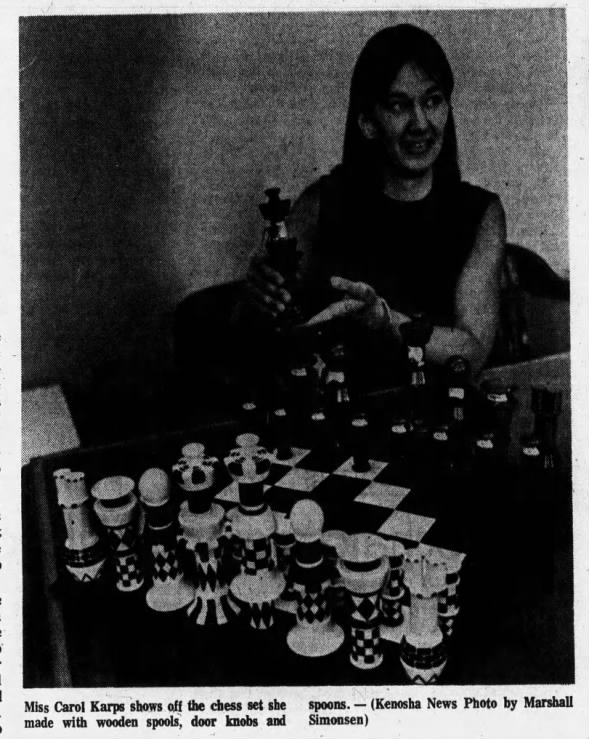
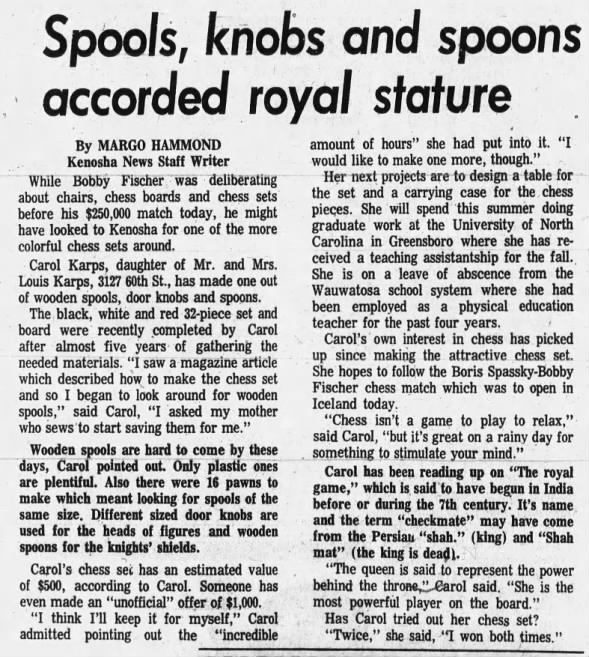 Spools, Knobs and Spoons Accorded Royal Stature 11 Jul 1972, Tue Kenosha News (Kenosha, Wisconsin) Newspapers.com
Spools, Knobs and Spoons Accorded Royal Stature 11 Jul 1972, Tue Kenosha News (Kenosha, Wisconsin) Newspapers.com
The Times-News Twin Falls, Idaho Tuesday, July 11, 1972 - Page 5
Another demand made before chess play starts
Reykjavik, Iceland (UPI) — The $250,000 world championship chess match between American Bobby Fischer and Russia's Boris Spassky was still go today, but Fischer made a last minute demand to stop televising the first of the 24-game series.
“There will be no TV filming tonight, but we hope some other arrangements can be made so they can film later during the match,” said Fred Cramer, vice president of the U.S. Chess Federation.
Fischer said the television cameras, hidden behind cloth-covered scaffolding above the stage where the players will sit, would distract him.
Fischer's opponent, world champion Boris Spassky, said he was ready to play. “Everything is fine with me,” said the Russian.
Cramer said earlier that Fischer was “go, go go.”
The first game was scheduled to start at 5 p.m. (1 p.m. EDT), with Fischer the experts' favorite but Spassky far ahead in the popularity poll.
Both men made final inspection tours of the sports arena where the match will be played. Fischer made an unannounced tour early in the day and Spassky strolled in at noon (8 a.m. EDT).
Spassky studied the chess board and picked out a chair from among several provided by the Reykjavik furniture stores. Fischer earlier had his favorite chair flown in from New York.
Fischer earlier complained about a number of details in the hall, including the lighting, the chess board and the size of the chess pieces, the television cameras and the thickness of the window drapes. ([BOTH sides lodged complaints. The Soviets, had filled Western media outlets with a flood of reports on their demands, upon demands, complaints and scathing invective about Fischer, for months on end, far outnumbering any last minute complaints made by Fischer.])
To accommodate Fischer, the lighting was dimmed and the first row of spectator seats was moved farther away from the stage so the nearest spectator would be about 25 yards away.
An unofficial poll among chess experts assembled in Reykjavik showed the 29-year-old Fischer the favorite. But most of Iceland's 210,000 chess-mad citizens were behind Spassky.
Only a few weeks ago the fans of Iceland were with the American ([ßülls#!!]) but he lost his popularity quickly when he demanded more money and failed to show up in time for the scheduled July 2 start of the match.
([Soviet Propaganda Warning!! The USSR snubbed Australia's legal bid of $225,000 and in a tantrum threatened not to play, forcing Iceland's heavily reduced bid down Fischer's throat… the never ceasing flow of Soviet demands and complaints delayed the match for months.])
While Fischer was in New York demanding more money, Spassky was walking the streets of Reykjavik patting children on the head, conversing with local chess players and piling up points in the prematch popularity contest.
The prize money was raised from the original $125,000 to $250,000 through a wealthy British banker named Jim Slater who came up with more cash to save the match.
The San Francisco Examiner San Francisco, California Tuesday, July 11, 1972 - Page 2
No Cameras At Matches
Reykjavik —(UPI)— The film and picture rights for the Boris Spassky-Bobby Fischer world chess match have been bought by an American company and all other still and film photographs are banned from the hall.
Chester Fox, Inc., of New York bought the rights from the Icelandic Chess Federation. ([Chester Fox, just another Soviet subversive in U.S. media helping the Soviet Empire realize it's goal to bury coverage of the match and preserve the illusions of Soviet invincibility and fascism. One of the chief complaints mentioned by Paul Marshall, Fischer's lawyer, during the holdout in New York was this bad move, bad faith on the part of the Icelandic Chess Federation, unconstitutional limitations on free press and coverage of the match.])
The action drew strong criticism from the Icelandic press several weeks ago and a special deal was worked out enabling Iceland's five daily newspapers to buy pictures from Chester Fox, Inc.
The Icelandic State Television, currently closed down for a four-week holiday, will also get free films after the first games have been played.
Cameramen and still photographers, who have no contract with the owner of the rights, will be barred from entering the hall unless they leave their cameras outside.
Above every entrance to the 3000 seat hall, is a big sign warning spectators that cameras are forbidden inside. ([This absurd Soviet/Icelandic demand, was against the wishes of Robert J. Fischer, along with Fischer's wish that the cameras that were in the hall weren't accompanied by NOISY camera-men as Fischer so eloquently explained to Johnny Carson in November 1972.])
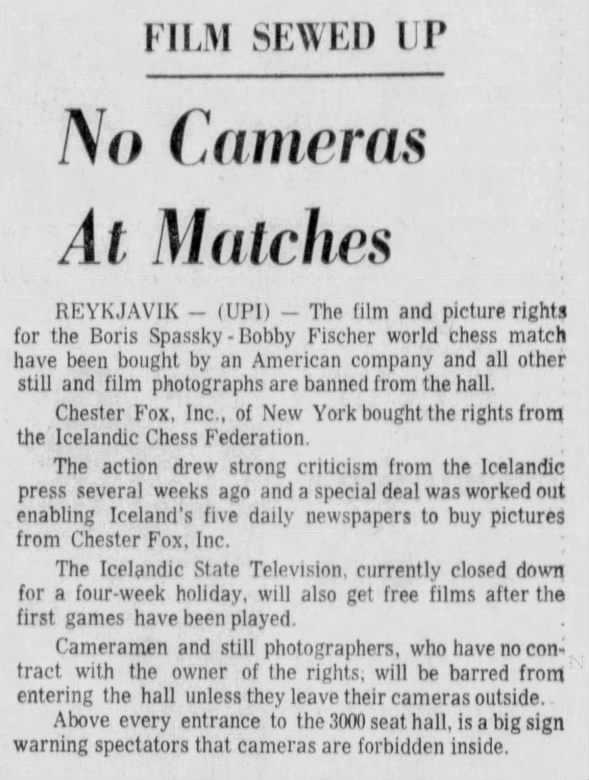 No Cameras At Matches 11 Jul 1972, Tue The San Francisco Examiner (San Francisco, California) Newspapers.com
No Cameras At Matches 11 Jul 1972, Tue The San Francisco Examiner (San Francisco, California) Newspapers.com
The San Francisco Examiner San Francisco, California Tuesday, July 11, 1972 - Page 2
Moves Listed In World Chess Play
Reykjavik (Iceland) — (AP) — Here are the moves of defending champion Boris Spassky and challenger Bobby Fischer in the opening game of their 24-game match for the world chess title.
Spassky (White) vs. Fischer (Black)
1. P-Q4 N-KB3 2. P-QB4 P-K3 3. N-KB3 P-Q4 4. N-B3 B-N5 5. P-K3 O-O 6. B-Q3 P-B4 7. O-O N-B3 8. P-QB3 B-R4 9. N-K2 QPxQBP 10. BxBP B-N3 11. PxP QxQ 12. RxQ BxP 13. P-QN4 B-K2 14. B-N2 B-Q2 15. QR-B1 KR-Q1 16. NK2-Q4 NxN 17. NxN B-R5 18. B-K3 BxB 19. NxB RxRch 20. RxR R-QB1 21. K-B1 K-B1 22. K-K2 N-K5 23. R-QB1 RxR
Caption: Artist's version of Big Chess Match
Fischer, with the black, and Spassky, the white. — AP Photo.
The San Francisco Examiner San Francisco, California Tuesday, July 11, 1972 - Page 2
Fischer Late for 1st Move
Reykjavik — American chess challenger Bobby Fischer showed up eight minutes late today for the start of the $250,000 world championship match with Russia's Boris Spassky.
Spassky, the reigning world champion and playing white, had already made the first move — the queen pawn — before Fischer walked into the sports arena.
Fischer walked up to Spassky and the two shook hands. Fischer studied the board for two minutes and moved his king knight to king bishop three.
Spassky made his move promptly at the start of the clock at 5 p.m. and spectators watched the clock tick away until Fischer appeared.
Got Apology
The match was postponed for more than one week, first while Fischer haggled over money ([and other objections these reporters dare not mention out of fear of retaliation from chess officials, such as the Icelandic Chess Federation's suppression of free press coverage]) and again when Spassky demanded — and got — an apology from Fischer.
Earlier, Fischer made a last-minute demand to stop televising of the 24-game match.
National prestige was at stake for the defending Russian. The Soviet Union subsidizes chess and has dominated the game for decades. Fischer is the first foreigner to make it to the finals since 1948.
For Fischer, it is a question of money and personal prestige, of proving his claim that he is the best in the world.
Lanky Favorite
London oddsmaker rated the lanky American the favorite to win the 24-game, two-month competition and capture more than $180,000 of the estimated $300,000, including TV rights, at stake.
The winner gets five-eighths of the $125,000 put up by the Icelandic Chess Federation, or $78,125, plus another $75,000 of the $120,000 provided by London investment banker James Slater to persuade Fischer to end his holdout last week. Organizers calculate Fischer and Spassky will divide at least another $55,000 from the sale of television and film rights.
The American's lawyer, Paul Marshall, told a newsman on the eve of play, however, that “the money's not important. Bobby wants respect on his own terms.”
Both players stayed in seclusion until the matches started.
The Honolulu Advertiser Honolulu, Hawaii Tuesday, July 11, 1972 - Page 23
Chess? It's Booming With Fischer by Ken Kobayashi
Bobby Fischer: The Great American Hope.
He can bring to America a world championship that the Soviet Union has dominated for 35 years (and some say always will should he lose).
And he can bring to chess what Ali brought to boxing, Palmer to golf, Namath to football: a hero image which would add flesh to that intellectual game and give it the popularity boost chess players have been long yearning for.
A LOT OF people are hoping he does both by beating world champion Boris Spassky of Russia in their best-of-24-game match which starts today in Iceland.
And some of those people are the regulars who play chess tirelessly on the benches along Kalakaua Avenue near Kuhio Beach.
“It's a tossup,” says Glenn Kageyama, who teaches the game at Fort Shafter. “The world grandmasters are divided.”
So are the local experts.
“FISCHER,” says Allan Kuwahara, president of the Hawaii Chess Association made up of about 30 active members, about 70 more inactive. “He's the most flawless player there is.”
“Spassky,” says Chris Au, a 20-year-old whiz with a 1,680 rating, similar to about a five-handicapper in golf. “Probably because he has the edge with all the Russian analysis. The Soviet Union has all the grandmasters. The United States has fewer than 10, the U.S.S.R. 30 to 40.”
IT GOES ON. Fischer supporters point to his unprecedented comeback, which included beating three grandmasters in his fight to gain the right to meet Spassky. The American defeated the first two in 12 straight games, unheard of since draws are common.
But Spassky supporters say even on Fischer's comeback, the Russian outplayed his challenger, and has an impressive overall record against Fischer, beating him three times, drawing twice and never losing.
Regardless, though, most of the players were happily surprised by all the publicity over the match and believe it can only help increase interest in the game.
EVEN NOW, the Honolulu Bookstore at Ala Moana notes that chess paperbacks are going as fast as they can be shelved. “They're going as soon as they're out,” says a sales clerk. “Interest has been up over the past couple of months.”
The best seller? “Bobby Fischer Teaches Chess.”
For Kuwahara and his club which meets first and third Sundays each month 1 p.m. at the Moiliili-McCully library, the Fischer phenomenon has had considerable impact.
“I had a lot of calls during the past few weeks, especially from young people,” he said. “We can hardly keep up. They're all hungry for tournaments.”
KUWAHARA, who has been playing the game 19 of his 29 years, thinks interest will take an even bigger jump should Fischer win.
“Fischer is interested in money,” said Kuwahara, an accountant. “If he wins, he'll go on an exhibition tour and he's wanted everywhere. That's going to create even more interest.”
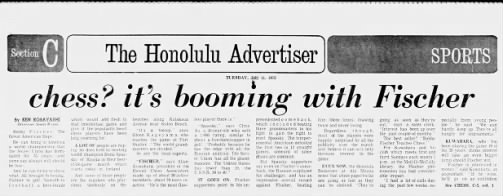 Chess? It's Booming With Fischer 11 Jul 1972, Tue The Honolulu Advertiser (Honolulu, Hawaii) Newspapers.com
Chess? It's Booming With Fischer 11 Jul 1972, Tue The Honolulu Advertiser (Honolulu, Hawaii) Newspapers.com
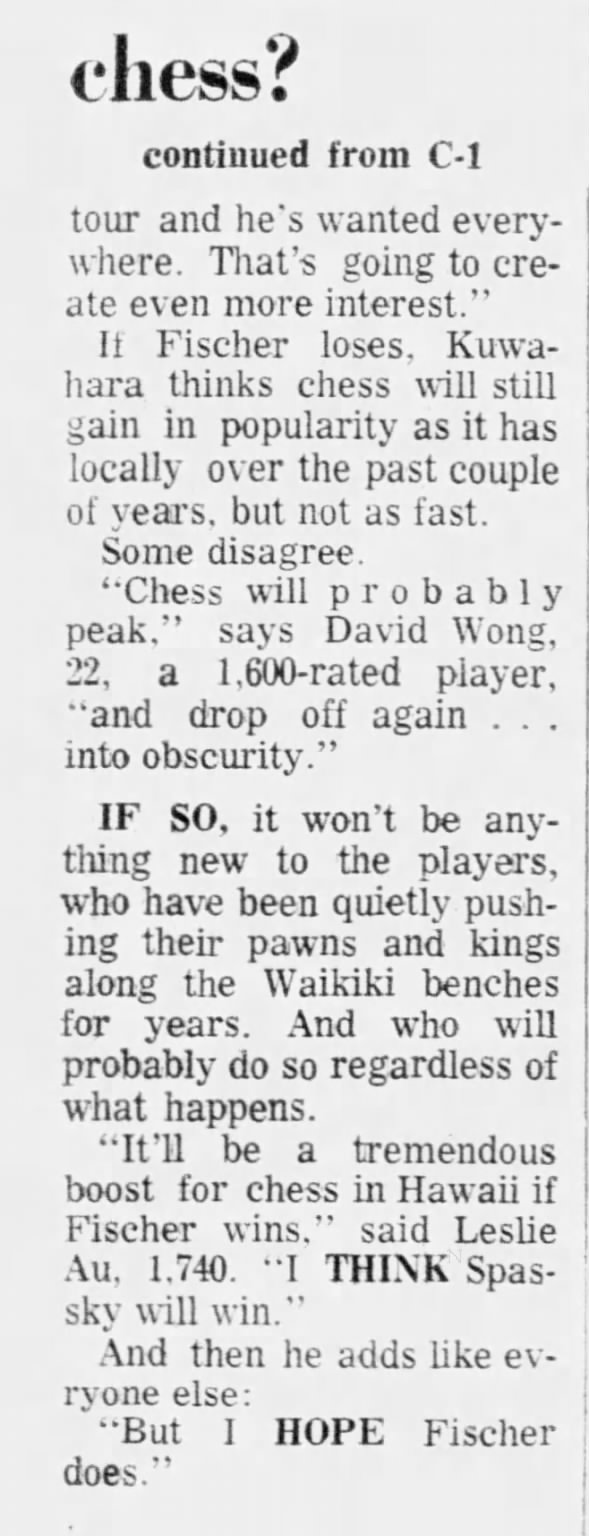 Chess? 11 Jul 1972, Tue The Honolulu Advertiser (Honolulu, Hawaii) Newspapers.com
Chess? 11 Jul 1972, Tue The Honolulu Advertiser (Honolulu, Hawaii) Newspapers.com
If Fischer loses, Kuwahara thinks chess will still gain in popularity as it has locally over the past couple of years, but not as fast.
Some disagree.
“Chess will probably peak,” says David Wong, 22, a 1,600-rated player, “and drop off again … into obscurity.”
IF SO, it won't be anything new to the players, who have been quietly pushing their pawns and kings along the Waikiki benches for years. And who will probably do so regardless of what happens.
“It'll be a tremendous boost for chess in Hawaii if Fischer wins,” said Leslie Au, 1,740. “I THINK Spassky will win.”
And then he adds like everyone else:
“But I HOPE Fischer does.”
Spokane Daily Chronicle Spokane, Washington Tuesday, July 11, 1972 - Page 16
Who Gets It?
Moscow (AP) — What can Russian Boris Spassky do with the money he gets for playing Bobby Fischer in the world chess championship in Iceland?
The winner will get something in the neighborhood of $180,000, including a cut on the sale of television and movie rights. The loser will take home around $120,000.
The normal procedure for a Soviet citizen who comes into a wad of dollars is for him to exchange them for certificates that enable him to buy in special Soviet stores. He also can open a foreign bank account or import Western commodities.
Cellist Mstislav Rostropovich bought a Mercedez-Benz with some of his earnings from playing abroad.
But there seem to be no hard and fast rules.
Neither Spassky nor the Soviet Chess Federation has said what he will do with his money.
The Fresno Bee The Republican Fresno, California Tuesday, July 11, 1972 - Page 3
Fischer Arrives Late For World Chess Match Start
Reykjavik, Iceland (AP) — The world championship of chess got under way today without Bobby Fischer, the American challenger. He showed up seven minutes after Russian titleholder Boris Spassky made the first move.
Queen's Pawn
Spassky was there on the dot of 10 a.m., waited a minute, then calmly pushed his queen's pawn forward two spaces.
Referee Lothar Schmid of West Germany pushed the button on the time clock and the match had begun.
Then seven minutes after Spassky began the game, Fischer appeared from offstage left. With long strides he sped to the black leather swivel chair placed behind the white side of the board.
Applause which greeted Fischer's arrival arose in crescendo when Spassky moved forward from the side of the stage where he had been waiting to shake Fischer's hand.
The American took a minute to regard the board and the queen's pawn opening Spassky favors.
He moved his queen's side knight to the queen's bishop three square.
Spassky seated himself and replied with a threat to the center of the board with his queen's bishop's pawn. Fischer pushed his king's pawn forward a square.
Experts said it looked as if a Nimzo-Indian defense was shaping up.
Fischer has three loses and two draws with Spassky in five previous games. Fischer has never beaten the Russian playing black.
National prestige was at stake for the defending Russian. The Soviet Union subsidizes chess and has dominated the game for decades. Fischer is the first foreigner to make it to the finals since 1948.
For Fischer, it is a question of money and personal prestige, of proving his claim that he is the best in the world.
London oddsmaker rated the lanky American the favorite to win the 24-game, two-month competition and capture more than $180,000 of the estimated $300,000 at stake.
The winner gets five-eighths of the $125,000 put up by the Icelandic Chess Federation, or $78,125, plus another $75,000 of the $120,000 provided by London investment banker James Slater to persuade Fischer to end his holdout last week. Organizers calculate Fischer and Spassky will divide at least another $55,000 from the sale of television and film rights.
The American's lawyer, Paul Marshall, told a newsman on the eve of play, however, that “the money's not important. Bobby wants respect on his own terms.”
Both players stayed in seclusion. Spassky was reported nervous and upset.
Fischer, who favors sleeping in the daytime, was last seen at 1 a.m., Monday.
The Missoulian Missoula, Montana Tuesday, July 11, 1972 - Page 13
Let The Match Begin
American Bobby Fischer, left, and Russian Boris Spassky will square off in the World Chess Championship in Reykjavik, Iceland, Tuesday at 1 p.m. EDT. Fischer, the challenger, drew black, leaving Spassky, the present champion, with white and the first move (AP Photofax)
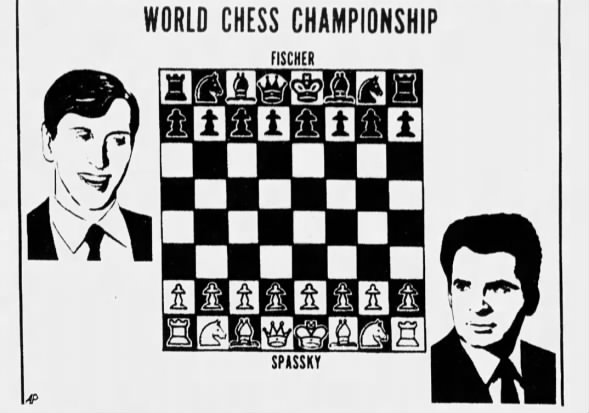
 Let The Match Begin 11 Jul 1972, Tue The Missoulian (Missoula, Montana) Newspapers.com
Let The Match Begin 11 Jul 1972, Tue The Missoulian (Missoula, Montana) Newspapers.com
Wisconsin State Journal Madison, Wisconsin Tuesday, July 11, 1972 - Page 8
Chess Match Merits Front-Page Coverage
Sirs—Recently I have overheard criticism of The Wisconsin State Journal for giving front-page coverage to the Bobby Fischer affair. I am glad to see chess at last receiving the attention it deserves.
It is not unusual for the Olympics or the World Series to receive front-page treatment. No one argued that the Supreme Court anti-trust decision about baseball should have been consigned to the back pages. If any sporting event ever merits such treatment, then the world championship of chess does now. Chess is a difficult and demanding game, and America has a golden opportunity to capture, through Fischer, the world championship. In the Soviet Union chess champions are revered as national heroes.
Congratulations to The State Journal and the rest of the media for at last giving Fischer and chess a well-deserved prominence in the news.—Martin H. Dickinson, 1483 Carver St., Madison, Wis.
Wisconsin State Journal Madison, Wisconsin Tuesday, July 11, 1972 - Page 8
He Objects to Journal's Support of Soviet “Anti-American” Political Invective and Smear Campaign
Sirs — I am happy to see that The Wisconsin State Journal has decided to back Boris Spassky in the up-coming chess match of the century. I was becoming worried that I might agree with something the Journal supported.
It is evident that you fail to realize that chess is and always has been Bobby Fischer's (sic) profession, and that only he can judge how much this tournament is worth to him. ([Soviet Payrolled Editor notes “sic” in parenthesis, mocking mention of Fischer's “profession” as a chess player. But withholds his mockery that Spassky, himself, is also a professional chess player, subsidized by the Soviet Empire. Completely understandable, employed by Soviets to abuse public trust and publishing Pro-Soviet propaganda. Rooting for the Soviet Empire and their racism, antisemitism and Anti-American chauvinism. All in a day's work!])
After all, the United States has not supported him during all these years; he has been training as is done in Russia.
It is also possible that Bobby Fischer is repaying some of the humiliation which has been dealt to him by the Soviets in the past. Where was The State Journal over the years when the Soviets were cheating Bobby Fischer out of tournament championships by the underhanded cheating between comrades? It was this cheating which almost forced Bobby Fischer to quit chess altogether.
It is also possible that this whole affair is just part of the pre-tournament “psyching out” between players, but, of course, your editor doesn't understand that.
Why doesn't The State Journal stick to the reporting of important news such as Gov. Lucey's son's trip from Vermont and leave the unimportant stuff, such as the breaking and entering of the Democratic Convention and the world chess championship, to interested newspapers? — John S. Daniel, 2501 Fremont St., Madison, Wis.
Standard-Speaker Hazleton, Pennsylvania Tuesday, July 11, 1972 - Page 1
Finally, Chess Match On
Reykjavik, Iceland (AP) — American Bobby Fischer and Russian defending champion Boris Spassky finally squared off today for the world championship of chess—the riches and most publicized match of all time.
Spassky had the first move.
The match is 24 games and could last two months. Fischer needs 12½ points to win; Spassky 12, or a draw, to retain his title. A player gets one point for winning a game and a half-point for a draw.
Last-minute adjustments were being made on the stage of Reykjavik's 2,500-seat sports hall. The playing table was shortened, the green-and-white marble chessboard constructed four the fourth time, and the overhead lighting changed.
But these were small details compared to the tangled negotiations and war of nerves that preceded the encounter, originally set to start July 2.
Spassky, 35, drew the white chessmen and with them the first move. Fischer, 29, of Brooklyn, N.Y., had the black pieces. One game will be played each Tuesday, Thursday and Sunday, starting at 5 p.m. — 1 p.m. EDT.
National prestige was at stake for the defending Russian. The Soviet Union subsidizes chess and has dominated the game for decades. Fischer is the first foreigner to make it to the finals since 1948.
For Fischer, it is a question of money and personal prestige, of proving his claim that he is the best in the world.
London oddsmaker rated the lanky American the favorite to win the 24-game, two-month competition and capture more than $180,000 of the estimated $300,000 at stake.
The winner gets five-eighths of the $125,000 put up by the Icelandic Chess Federation, or $78,125, plus another $75,000 of the $120,000 provided by London investment banker James Slater to persuade Fischer to end his holdout last week. Organizers calculate Fischer and Spassky will divide at least another $55,000 from the sale of television and film rights.
Both players stayed in seclusion. Spassky was reported nervous and upset.
Fischer, who favors sleeping in the daytime, was last seen at 1 a.m., Monday, when he visited the sports hall. He demanded that the mahogany playing table be shortened and the overhead lights be changed.
The challenger also agreed with the Russian's complaints that the squares on the chessboard were too large in relation to the size of the pieces.
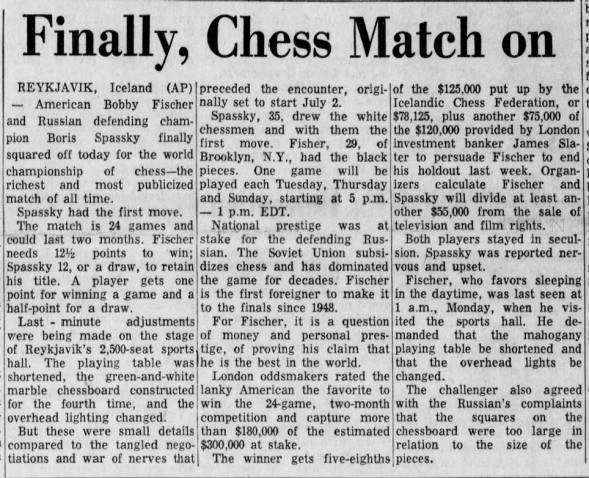 Finally, Chess Match On 11 Jul 1972, Tue Standard-Speaker (Hazleton, Pennsylvania) Newspapers.com
Finally, Chess Match On 11 Jul 1972, Tue Standard-Speaker (Hazleton, Pennsylvania) Newspapers.com
The Honolulu Advertiser Honolulu, Hawaii Tuesday, July 11, 1972 - Page 23
Fischer Gets Experts' Nod by Ian Westergren
Reykjavik, Iceland (UPI) — Despite some last minute complaints about the playing conditions, Bobby Fischer was reported in a “Go, go, go” mood for the first game of his World Championship chess match with Boris Spassky of the Soviet Union today.
“Fischer does not like the lighting, the board and the pieces, the locations of the television cameras and some other minor details,” said Fred Cramer, vice president of the U.S. Chess Federation.
“These things are troublesome but not critical,” he said. “The organizers are already doing something about it.”
Cramer, pronounced the American in “Go, go, go” condition for the first game.
WHILE Fischer was still discussing the setup, the chess experts assembled in Iceland were predicting the outcome of the “chess match of the century,” as the Spassky-Fischer match has been billed.
A private poll taken among the experts was in Fischer's favor. Many experts noted that Fischer in fact has a higher point rating in the complex international rating system than does Spassky, who has not been playing at his best recently.
Fischer also impressed the chess work in his qualification matches. He beat Mark Taimanov of the Soviet Union and Bent Larsen of Denmark in six straight games and then overwhelmed former world champion Tigran Petrosian 6.5 points to 2.5.
THE MATCH, already delayed for nine days, will begin at 5 p.m. (1 p.m. EDT) today in a 3,000-seat hall especially outfitted to accommodate the Russian world champion and the challenger.
The match originally was to have begun July 2, but it was delayed because Fischer attempted to negotiate for 30 per cent of the admission fees the organizers are charging in addition to a $125,000 purse and a percentage of the television rights. He came to Iceland and dropped his demand for a percentage of the gate only after a British banker put up sufficient money to double the purse to $250,000.
In addition to the world championship, which Spassky currently holds, the winner oft eh match will receive $150,000 from the purse. The loser will receive $100,000.
Fischer, 29, of Brooklyn, N.Y., slipped unnoticed into the hall early yesterday and spent 80 minutes inspecting details arranged for the match that is scheduled to go as many as 24 games. As champion, Spassky can win by being the first to accumulate 12 match points with one point for a victory and one-half point for a draw. Fischer as challenger needs 12.5 points to win.
Cramer, himself a retired lighting engineer, said he was not sure what Fischer objected to concerning the lighting.
“From an engineering point of view it's perfect and very flexible. But if you have to sit for five hours staring at a chess board you might have other ideas.” Cramer said.
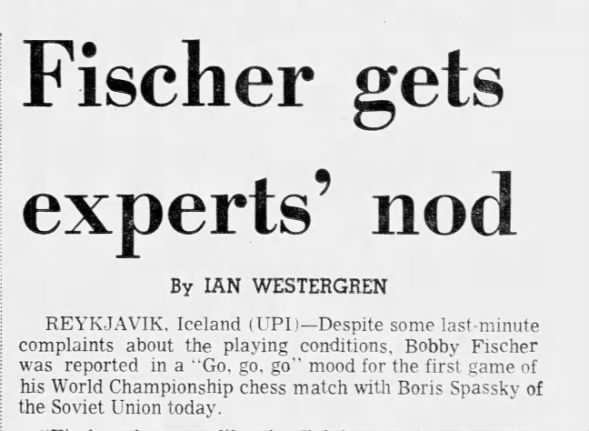
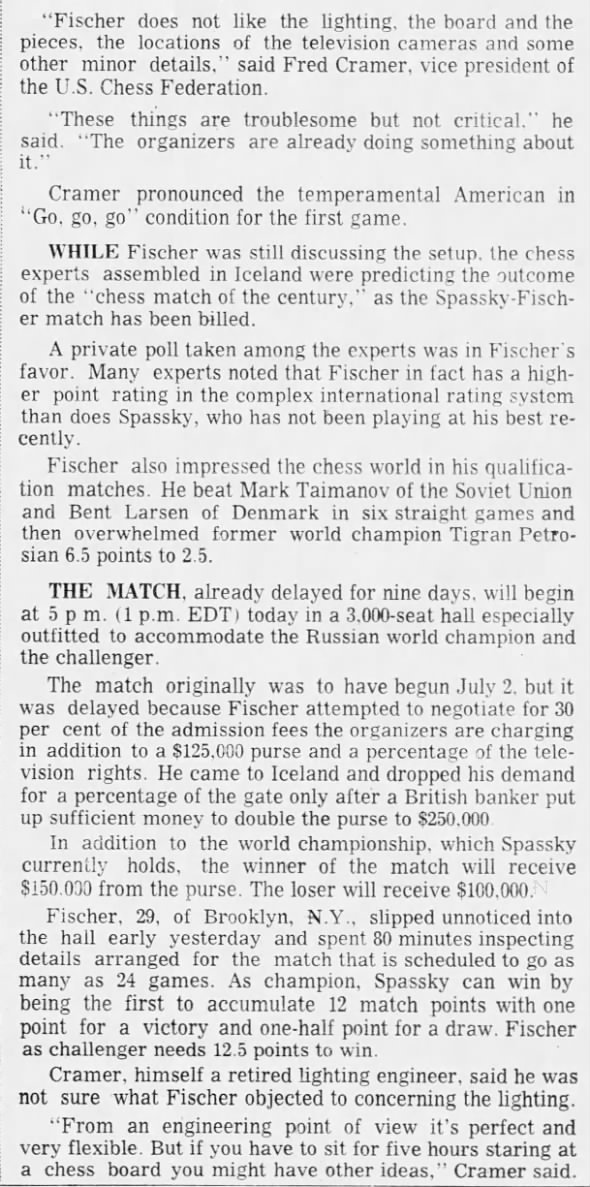 Fischer Gets Experts' Nod 11 Jul 1972, Tue The Honolulu Advertiser (Honolulu, Hawaii) Newspapers.com
Fischer Gets Experts' Nod 11 Jul 1972, Tue The Honolulu Advertiser (Honolulu, Hawaii) Newspapers.com
Florence Morning News Florence, South Carolina Tuesday, July 11, 1972 - Page 2
Fischer's Demands Met; Chess Tourney Set Today
Reykjavik, Iceland (AP) — Bobby Fischer didn't like the site, the money or living with the Chinese. ([Neither did the Soviets. That huge $225,000 bid by Australia and Mexico's $175,000 sent shivers up the Soviet's Draconian authoritarian spines … “Chinese???”. It's a historical fact, Fischer married a woman of Asian ancestry, however, the Icelanders are feverishly racist, and forbid entry of anyone considered a darker shade of brown, for “fear of living with” them..])
He objected to the lighting and the playing table.([so did the Russians.])
He demanded a German sports car with an automatic transmission ([because the Soviet-spawned Icelanders think a mule-drawn cart, or perhaps a nice pair of walking shoes should suffice more suitably for the American, whilst their own champion demanded the extravagance of a four wheel drive]).
He didn't like the chess board, either, but Icelandic and Russian officials had beaten him to the punch with their own objections on that point.
Fischer has gotten most of what he wanted, and on Tuesday at 5 p.m.—1 p.m. EDT—he will emerge from his seclusion ([where he has been reported well-rested, and in good spirits and ready to go, go, go, so where the author got “moody” at is a complete mystery, or “living with the Chinese” as seen above? Who knows? But nobody has seen Bobby reportedly since the early morning of Monday]), to play Boris Spassky of the Soviet Union for the world championship of chess.
The match, in 24 games, ought to last about two months, and in it two men will be matching their wits in the kind of intense commitment and concentration that few other endeavors require.
At stake for Fischer, a 29-year-old American, is a chance to be rich ([but he didn't care about the money and gave the bulk of it away to the church he followed with unwavering belief, faith, and sincere devotion]), and to gain the allegiance of the American public for the game which has totally absorbed his intelligence ([so true, for had his intelligence been more evenly spread, life-wide, he might would have questioned the doctrines of Armstrong before 1972-1976, and escaped the cult's tentacles so much sooner]).
For Spassky, 35 years old, and the men behind him, Soviet national prestige is involved.
Since 1948, Russians have dominated the game so completely that no foreigner, until Fischer, has ever made it to the finals. Experts on Soviet life consider chess to have become a pawn of Soviet policy.
The fact that the challenger is an American at the peak of his powers may help explain why Spassky was reported to be “nervous and upset” on the eve of the match. ([Not forgetting to mention, Spassky himself reported by 1985, Moscow was breathing down his back. Spassky laid the blame on Moscow, not Fischer.])
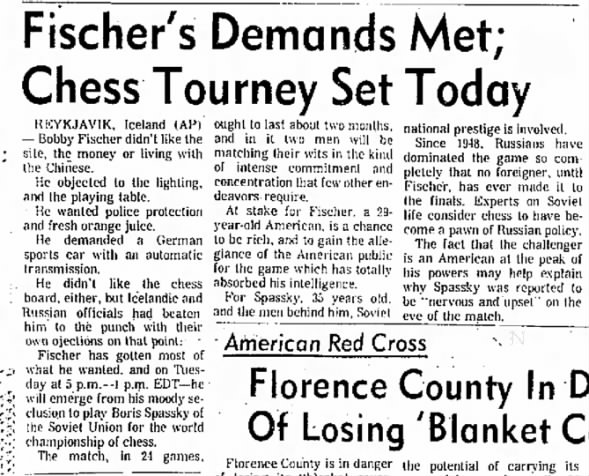 Fischer's Demands Met; Chess Tourney Set Today 11 Jul 1972, Tue Florence Morning News (Florence, South Carolina) Newspapers.com
Fischer's Demands Met; Chess Tourney Set Today 11 Jul 1972, Tue Florence Morning News (Florence, South Carolina) Newspapers.com
The Herald Statesman Yonkers, New York Tuesday, July 11, 1972 - Page 8
Fischer-Spassky Chess Duel Opens-Finally
American challenger Bobby Fischer and Russian defender Boris Spassky finally begin play today in the richest and most publicized world chess championship of all time — unless some new snag develops.
Last minute adjustments were being made on the stage of Reykjavik Iceland's 2,500 seat sports hall. The playing table was shortened, the green-and-white marble chessboard constructed for the fourth time, and the overhead lighting changed.
Spassky, 35, drew the white chessmen and with them the first move. Fischer, 29, of Brooklyn, had the black pieces. One game will be played each Tuesday, Thursday and Sunday.
 Fischer-Spassky Chess Duel Opens-Finally 11 Jul 1972, Tue The Herald Statesman (Yonkers, New York) Newspapers.com
Fischer-Spassky Chess Duel Opens-Finally 11 Jul 1972, Tue The Herald Statesman (Yonkers, New York) Newspapers.com
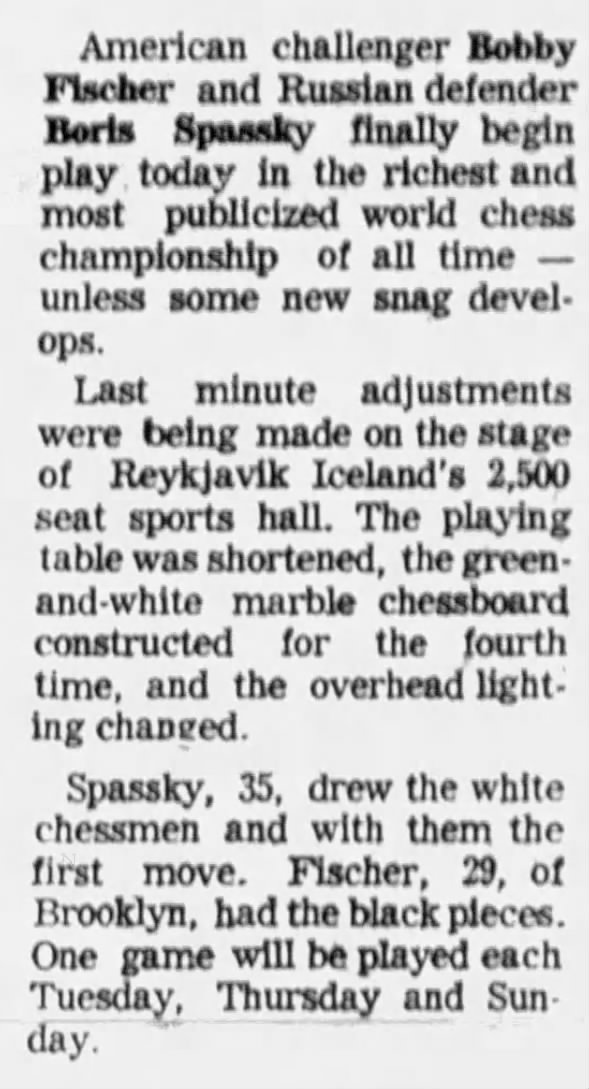 Fischer-Spassky Chess Duel Opens-Finally 11 Jul 1972, Tue The Herald Statesman (Yonkers, New York) Newspapers.com
Fischer-Spassky Chess Duel Opens-Finally 11 Jul 1972, Tue The Herald Statesman (Yonkers, New York) Newspapers.com
Valley Morning Star Harlingen, Texas Tuesday, July 11, 1972 - Page 8
What Is A Sport? by Bob Lapham
JUST WHAT are these things human beings go for that they refer to as sports?
“I'll tell you one thing … if I don't smell no sweat, it aint no sport,” one erudite advocate of the Jock Jungle's more basic philosophies might answer. And maybe he's right.
But the word “competition” is the backbone of “sport”, since that's what it is all about. Of course competition can run from one businessman trying to cut another out of the trade both seek, to wars between giant nations.
Well, maybe in a way both of these could be called “sports”, if you wanted to stretch the basic definition of the word. The former necessitates a set of rules whereby the contestants will be vying on equal terms from the start, and may the best man get filthy rich. The latter in- involves all the concepts of masterful coaching —from the sidelines, of course. The sidelines way back from the field of action.
Both examples stretch the definition of the word, naturally. Which brings us to a couple more, one in particular. Chess and bridge.
The pastimes are highly competitive. Each is climaxed by declaring a winner and a loser—usually. But are they sports.
SI Says Yes
SPORTS Illustrated magazine feels they are, and runs frequent articles on them along with football, baseball, hockey, basketball, golf track and field, tennis and the lot. That isn't to say SI is the ultimate authority, for it can be challenged quite frequently in the way its writers and editors handle things, I feel.
I know absolutely nothing about chess. Nothing. I do play bridge, attested by the fact that I can go down three tricks doubled, redoubled and vulnerable with all the flair of a scrambling quarterback being trapped for a 40-yard loss.
And don't think there's no sweat involved, either. Especially when I am partner to my wife. We both sweat a lot, and the language across the table would rival that of a baseball dugout of a team trailing 11-1 in the bottom of the eighth, with the pitchers harping at the hitters and the batsman blaming the hurlers, both sides pulling out all the stops in their vocabularies' more expressive areas.
Chess, with the big on-again, off-again money match between Bobby Fischer and Boris Spassky, is making daily news on the world's wire services. UPI our sports wire (we also have Associated Press' general wires, and it has done likewise) has run lengthy pieces on the goings-on. On our sports hookup, to boot.
We have done little with it, but maybe we should. Maybe chess is just as sporty as the sweat set's stuff.
Since I know nothing whatsoever about the game I yield to a chess nut for the crowd which votes in the affirmative.
Chessmen Do, Too
“CHESS has a bad image among athletes and the public who may think chess players are a little bit sissy,” says Jim McKone, who as sports information director at Pan American University and as a chess player knows both worlds. “However, the facts can be surprising.
“Nobody knows if chess is a sport, an art, a science or just a game. But it is more than an art, because the artist can work alone and uninterrupted. A good chess player is like a shortstop who must think where to throw the ball, to first base or home plate, or not to throw it at all, while somebody else is trying to knock him down at the time. In other words chess has strong rivalry and competitiveness, without physical contact. In that respect it is like tennis, gold and other non-contact sports which involve thinking under pressure.”
On a more local level, McKone says chess is becoming a fast-rising pastime in the Valley. Mike Flewelling, a recent graduate of Harlingen High School is one of the top players. “The Valley champion is James Page of Brownsville. Other top players,” McKone says, “are John Taylor of Harlingen, and three very strong players from McAllen. Clifford Dean and the Garcia brothers, Israel and Clem.”
McKone says the Fischer-Spassky match has increased interest in area chess clubs. “The Harlingen Chess Club, which meets on Thursday night at the Episcopal (St. Albans) church. There is also a Brownsville Chess Club which meets on Friday nights at Higgie's Cafe.”
So McKone is one chessman who feels his game is a sport. Anybody else have any ideas?
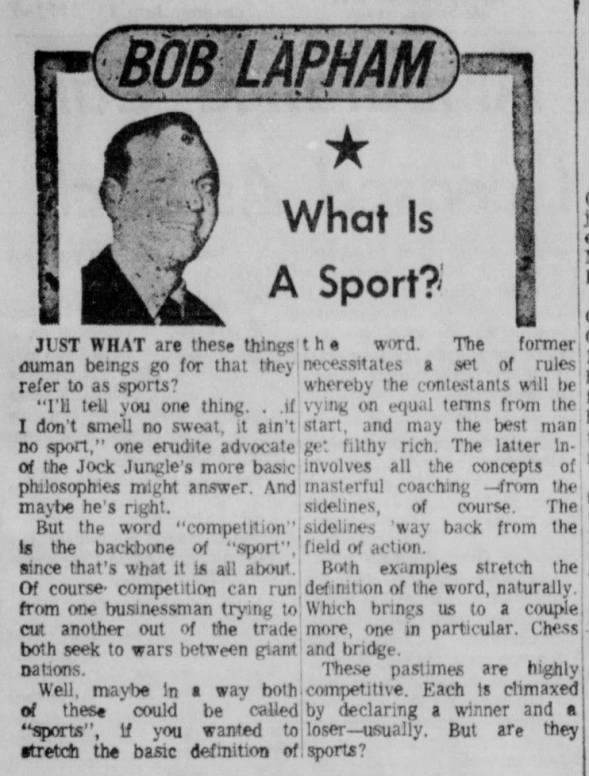 What Is A Sport? 11 Jul 1972, Tue Valley Morning Star (Harlingen, Texas) Newspapers.com
What Is A Sport? 11 Jul 1972, Tue Valley Morning Star (Harlingen, Texas) Newspapers.com
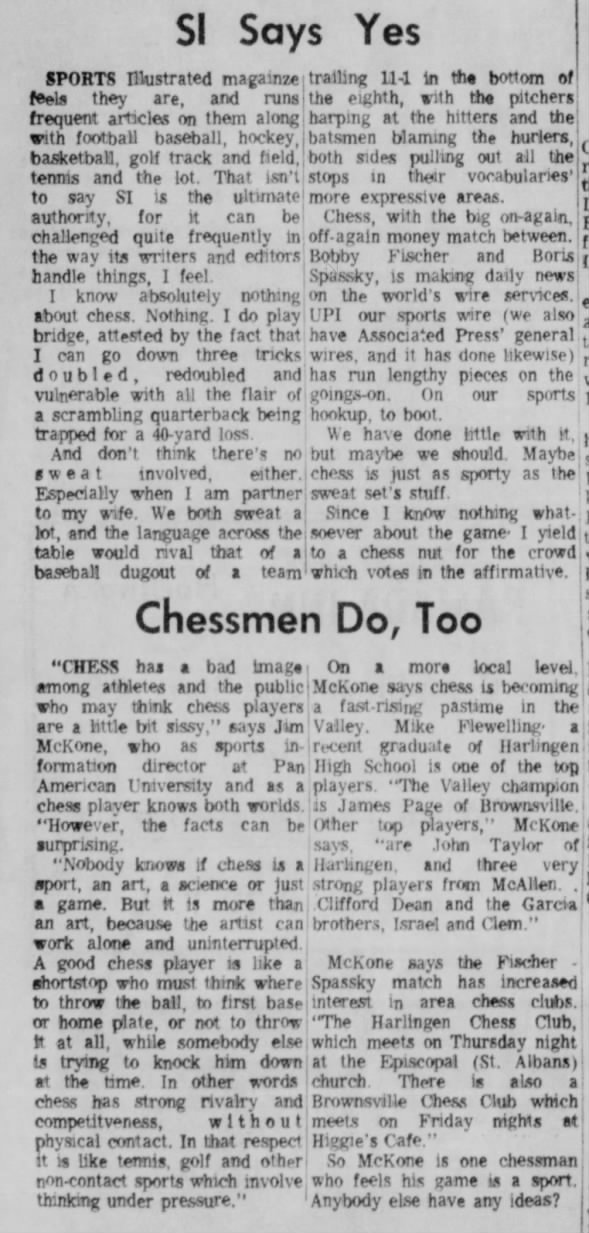 SI Says Yes. Chessmen Do, Too. 11 Jul 1972, Tue Valley Morning Star (Harlingen, Texas) Newspapers.com
SI Says Yes. Chessmen Do, Too. 11 Jul 1972, Tue Valley Morning Star (Harlingen, Texas) Newspapers.com
The Boston Globe Boston, Massachusetts Tuesday, July 11, 1972 - Page 33
Fischer, Spassky Play Chess -- Finally
Reykjavik, Iceland (AP) — Unpredictable American challenger Bobby Fischer turned up late for the opening of the world chess championship today, but made his first move in response to title-holder Boris Spassky's opening play.
The 29-year-old American was not in the hall when Spassky formally opened the 24-game match by moving his white pawn to queen four.
Icelandic officials at first said Fischer was staying away because they had not met his demands about moving back some seats in the audience.
But Fischer walked on to the stage seven minutes after Spassky's opening move, and replied by moving his knight.
Fischer's clock was running from the moment Spassky completed his first move and the time he was late will come off his total playing time.
Each player has a clock with 2½ hours of time in which to make 40 moves — making a total of five hours for the match.
As soon as one player moves, his clock stops and his opponent's starts.
Fischer and Spassky are playing for a purse totaling $250,000.
Spassky, after making his move, stood up and wandered around, apparently unconcerned at the absence of his opponent.
Fischer, who would have been disqualified only if he had turned up an hour later, walked onto the stage seven minutes later.
A murmur ran through the audience and a giant “silence” sign immediately lit up.
Icelandic sources said later that Fischer's advisers had a difficult time persuading him to go to the hall at all.
Fischer had complained bitterly at the organizers refusal to meet his demands that the front 10 rows of audience seating be removed.
The Boston Globe Boston, Massachusetts Tuesday, July 11, 1972 - Page 33
Chess Move by Move
Reykjavik, Iceland — Here are the moves of defending champion Boris Spassky and challenger Bobby Fischer in the opening game of their 24-game match for the world chess title. Spassky - white, Fischer - black.
1. P-Q, N-B3 2. P-QB4 P-K3 3. N-KB3 P-Q4 4. N-B3 B-N 5. P-K3 O-O 6. B-Q3 P-B4 7. O-O N-B3 8. P-QR3 B-R4
Elapsed time: White 8 minutes, black 10 minutes.
The opening was curious blend of unusual Manhattan defense with ubiquitous Nimzo-Indian.
9. N-K2 QPxQBP 10. BxBP B-N3 11. PxP QxQ 12. RxQ BxP 13. P-QN4 B-K2 14. B-N2 B-Q2
Elapsed time: 51 minutes white, 49 minutes black.
The Sedalia Democrat Sedalia, Missouri Tuesday, July 11, 1972 - Page 1
Late Again, Fischer Now Plays Chess
Reykjavik, Iceland (AP) — The World Chess Championship began today without Bobby Fischer, the American challenger.
Champion Boris Spassky of Russia arrived exactly on time at 5 p.m., waited a minute, then calmly pushed his queen's pawn forward two spaces.
Referee Lothar Schmid of West Germany pushed the button on the time clock and the match had begun.
Fischer sometimes chooses to be late to tournaments and matches. It was not known where he was.
Then seven minutes after Spassky began the game, Fischer appeared from offstage left. With long strides he sped to the black leather swivel chair placed behind the white side of the board.
Applause which greeted Fischer's arrival arose in crescendo when Spassky moved forward from the side of the stage where he had been waiting to shake Fischer's hand.
The American took a minute to regard the board and the queen's pawn opening Spassky favors.
Fischer moved his queen's side knight to the queen's bishop three square.
Spassky seated himself and replied with a threat to the center of the board with his queen's bishop's pawn. Fischer pushed his king's pawn forward a square.
Fischer has three losses and two draws with Spassky in five previous games.
The Daily Reporter Greenfield, Indiana Tuesday, July 11, 1972 - Page 6
Sports Whirled: Bobby and Boris By Paul Nussbaum, Reporter Sports Editor
Today, hopefully, finally, the world's super chess match is going to begin with Russia's Boris Spassky and the United State's Bobby Fischer facing each other in Reykjavik, Iceland.
Despite all the pre-competition excesses — Fischer's demands for more money and a different chair, Spassky's request that the postponed first match be forfeited to him — the scheduled 24 game work championship should be worth the wait and the expense (Fischer and Spassky are playing for $250,000).
As every semi-literate person in the world must know by now, the contest shapes up to be the classic conflict between Communist and capitalist ([WRONG! One man, Robert J. Fischer vs. the Soviet Empire]), experienced champ and one-time boy wonder.
Fischer, always slim and now 28, lives an introverted life centered around an introverted game. He seems to find no time for girl friends or cars or socializing, things that are usually so important to young men. His only constant companions are his chess board, his chess books and his 32 unchanging chessmen.
Spassky, on the other hand, is a gregarious “Russian Bear,” who has trouble keeping his weight down. But he has no difficulties with his chess. Surrounded by the best strategists in the Soviet Union, the 35-year-old defending world champion never lacks advice. And the paternal state has seen that he lacks little else, either. He lives in a luxurious apartment, drives a foreign sports car and draws a salary that is three times as high as that of the average Russian worker.
The two men play very different brands of chess too. Fischer is aggressive, and would much rather take risks to achieve a win that settle for a draw. Spassky is more likely to be satisfied with a draw, preferring the sure tie over a possible loss.
Former meetings between Fischer and Spassky have ended in the Russian's favor: in five previous games, Boris has won two and drawn three. But Fischer's game has improved considerably since he last played Spassky two years ago and so this less-than-expert analyst is going to stick his neck out and predict that when the 24 games have been completed, Bobby Fischer will be the new champion. But whatever the outcome, the contestants' very different personalities and playing styles should make the match worth following.
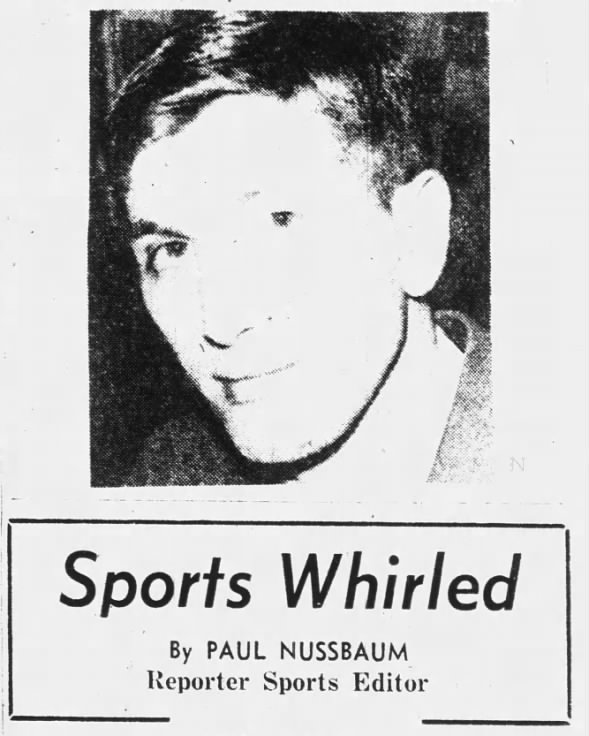
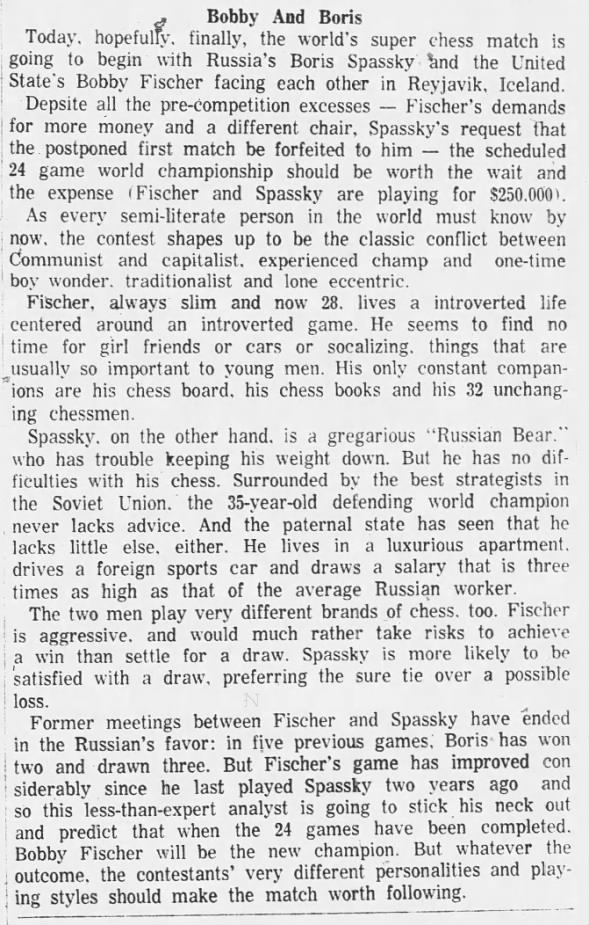 Sports Whirled: Boris and Bobby 11 Jul 1972, Tue The Daily Reporter (Greenfield, Indiana) Newspapers.com
Sports Whirled: Boris and Bobby 11 Jul 1972, Tue The Daily Reporter (Greenfield, Indiana) Newspapers.com
Democrat and Chronicle Rochester, New York Tuesday, July 11, 1972 - Page 17
'Best Games Ever'
While most people were dismayed and surprised by Bobby Fischer's on-again, off-again antics before his world championship ([I'm not, after reading the newspapers and learning of the Soviet antics, as Fischer's friend Ken Smith called it “old hands”. For instance Belgrade/Reykjavik organizers refusing to communicate with Fischer pre-match, in spite of Edmondson's pleas. Or tell of Belgrade's illegal 35K USD guarantee the USCF refused to shell up because as Edmondson confirmed it was ILLEGAL. The Soviet/European counterparts had no respect for contractual obligations. After Belgrade withdraws, Euwe makes an offer, worldwide, “first come, first serve” and Australia's and Mexico's whopping bids of 225K and 175K were snubbed by the Soviet via pressure on Euwe to renege on his word, because the Soviet had no respect for contracts, or, USSR picking the fiercely Anti-American, notoriously racist, Iceland to demoralize Fischer. Plots to maneuver a blackout on media coverage, and schemes to get Fischer disqualified and replace Fischer with USSR's Petrosian. Not surprised at all that Fischer retaliated]) match with Russian champ Boris Spassky in Iceland, a local chess expert was amazed things have gone so smoothly.
Kenneth Rogoff, 19, of 435 Hillside Ave., said that many chess experts have picked Spassky to retain his championship, not because they think he could beat Fischer, but because they were counting on Fischer not to play. ([Soviet game plan, flood Western media with venomous invective published by Soviet saboteurs in Western press, aiming to demoralize Fischer, hoping he gets angry and quits. Not a shred of truth to most of the rubbish getting churned out in media.])
And Rogoff, the ninth ranked chess player in the United States, says that with Fischer's past tendency to walk out of major matches, he wouldn't be completely surprised if the match scheduled today never gets finished. ([and those Soviets are doing everything within their grasp to push Fischer's buttons, to make him do just that.])
But if it is completed, Rogoff is positive the young American will win.
“No doubt,” Rogoff said emphatically. “He's much stronger.”
“The only danger of Fischer not winning the match is if he loses the first game and somehow loses the second game and makes some excuse and walks out.”
Rogoff said that Spassky will be heavily favored for the first game since he drew white, while Fischer will probably be extremely aggressive and not content to draw the match.
“But Fischer's impossible to stop when he's white,” Rogoff added.
While he wasn't pleased with Fischer's behavior before the match ([and since Fischer was retaliating against the manipulative behavior of Soviets and those “old hands” in Belgrade and Reykjavik, Fischer merely “got even” with his tormentors. Good for him. I'm very disappointed in the behavior of the Soviets, who prefer manipulation instead of “fair play” and wait for their long overdue apologies for meddling and trying to throw the match in their favor!]), Rogoff said he still has to be credited with doing far more good than harm for the game, particularly in enhancing its popularity.
And Rogoff added that Fischer went through a grueling three-year qualification for the championship and wasn't paid for playing in the amateur affair.
“He is a professional chess player,” Rogoff said, “and he has to make a living at it.”
Rogoff, who is heading to Austria for a chess tournament, said he'll be looking forward to studying the games between Fischer and Spassky.
The Vincennes Sun-Commercial Vincennes, Indiana Tuesday, July 11, 1972 - Page 4
Youth Revolt?
The mention of chess invokes visions of bearded patriarchs bending over checkered boards in gilded drawing rooms. The high rank for chess players of “grand master” status has some indication of old age.
Yet the focus of the chess world today is on the world championship match between Bobby Fischer, age 28, and the defending champion Boris Spassky, age 35, while the British financier and chess wizard who bankrolled the match out of its early controversy is Jim Slater, age 43.
Which recalls that 50 years ago the Vicennes YMCA was sponsoring annual chess tournaments for teen-age players. Current interest in the Fischer-Spassky affair likely will bring a renewal of interest in the ancient game. “Pawn to Queen's Four” may come to have meaning to more and more Americans as the months pass.
There always have been many chess players, even in Midwestern America. But the game often is a family affair, played at such events as family reunions and sometimes to entertain grandpa, who isn't particularly interested in water-skiing. Big-city newspapers have found sufficient demand to publish regular columns by chess experts.
Now comes Bobby Fischer, fierce in his demands for recognition and money, forcing the championship match onto the world's front pages. Brought to the attention of general readers, the match has attracted much attention from readers who know nothing at all about the game but are interested in the international implications and of waving the flag.
There are said to be more chess players in Russia than in the rest of the world put together. This may be a result of the long, cold nights and lack of entertaining television in that country.
However we look at it, we might as well admit that the comparative youth of the main participants, the controversy over prize money and the attendant headlines are likely to bring a resurgence of interest in the game that is almost as old as man's wish to show himself better than his neighbor. But it is going to be a long time before there are more schoolboys walking to school with miniature chessboards in their pockets (ala Bobby Fischer) than are bouncing basketballs or tossing footballs.
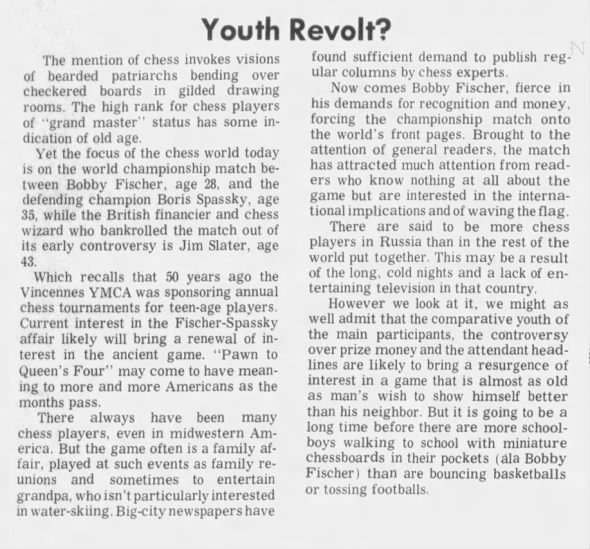 Youth Revolt? 11 Jul 1972, Tue The Vincennes Sun-Commercial (Vincennes, Indiana) Newspapers.com
Youth Revolt? 11 Jul 1972, Tue The Vincennes Sun-Commercial (Vincennes, Indiana) Newspapers.com
The Index-Journal Greenwood, South Carolina Tuesday, July 11, 1972 - Page 9
South Carolina Chess Champion Thinks Fischer Should Beat Spassky by Jim Cornwell
American interest in chess is growing, largely through the sparks generated by the Fischer-Spassky match slated to begin in Iceland.
Chess expert Otto Estenger of Greenwood speaks with some knowledge of the game as South Carolina's champion.
Estenger believes that Fischer should win.
According to Estenger, chess is a game requiring great concentration for long hours at a time.
“Fischer is younger and knows more moves,” he reasons. “He's in better condition and should win.”
Estenger won't venture to guess how the game would begin.
The standard move often used by Spassky would be pawn to Queen's bishop 4. However, Fischer, who has been studying Spassky's moves, should be alert enough to counter.
The move described by Estenger is one in which the white attacker (Spassky won the toss to go first and hence has white) goes on the offensive against his black opponent.
A prediction by Estenger is that if Spassky were to use this opening, Fischer would use the Sicilian Defense, a defensive strategy by which black attempts to slow down and check his attacker.
Estenger bases his prediction upon moves favored by the two antagonists, but cautioned that there are really many different opening and counters. Fischer and Spassky having studied each other's style might very well come up with some other moves. However, Estenger agrees, “in chess the expected is often the unexpected.”
Estenger won't make any predictions for plays past the opening move saying there were so many possible combinations.”
Estenger feels that Fischer's “on-off-on” attitude towards the match should not give either of the players an advantage.
“Once in New York, Fischer became extremely upset because of c*g*r*tt* smoke in the room in which he was playing,” said Estenger.
Fischer, by Estenger's assessment, is a genius. “He's good and he knows he's good. Some people don't like him because he admits he's good.”
Fischer will face one serious disadvantage. The games are scored under the point system, one point for a win and one-half point for a draw. Spassky only has to score 12 points out of the 24-game match to win. Fischer will have to score 12½ points to win since he's the challenger.
Estenger thinks it quite likely that Spassky will settle for draws, while Fischer will be going after victories.
He concluded, “Spassky thanked Fischer for getting him (Spassky) a new apartment and car. After this match is over, the Russians may take it away from him again.”
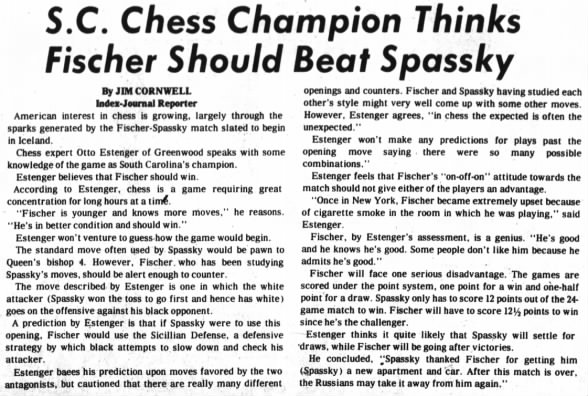 South Carolina Chess Champion Thinks Fischer Should Beat Spassky 11 Jul 1972, Tue The Index-Journal (Greenwood, South Carolina) Newspapers.com
South Carolina Chess Champion Thinks Fischer Should Beat Spassky 11 Jul 1972, Tue The Index-Journal (Greenwood, South Carolina) Newspapers.com
The Holland Evening Sentinel Holland, Michigan Tuesday, July 11, 1972 - Page 1
Chess Match Uses Chairs From Zeeland
Zeeland—Thanks to a Zeeland firm, the international chess match in Iceland will continue with matched chairs.
Herman Miller Inc. is supplying a matching conference chair for use by the Russian chess player, Boris Spassky. The chair is to be flown from New York by Icelandic airlines to Iceland with arrival scheduled at 5:30 a.m. Wednesday, Iceland time.
Herman Miller officials said U.S. Chess Player Bobby Fischer ordered a chair for use in the match because Fischer was not satisfied with chairs offered him in Iceland.
Chess officials said a matching chair should be provided for the Russian player and arrangements were made from Zeeland to supply a matching chair.
The matching chair in black was supplied by a Herman Miller dealership in New York City. The agreement was reached during a telephone call between Zeeland, New York and Iceland today.
Fischer used a Herman Miller chair during previous chess matches in South America and requested such a chair for his match in Iceland.
The Baltimore Sun Baltimore, Maryland Tuesday, July 11, 1972 - Page 14
The Right Move at Reykjavik
By the time Russian Chess Champion Boris Spassky makes the first move today, all the tempestuous antics leading to his 24-game match with Bobby Fischer, the American challenger, will have been forgotten. ([Actually no, the Soviets are only beginning to ramp up their campaign of defamatory invective in American newspapers. But they're going to lose, and not a word is being reported on the finicky, overbearing demands and complaints of European-Soviet organizers who refused for months to sort out details BEFORE match. Or, speaking of money, Belgrade's illegal demand of 35K USD “guarantee” refused by the USCF! Australia's legal $225K bid snubbed by Russia, with the Soviet threatening they “would not play” unless they got their way... for the countless time. USSR selecting a cesspool of Anti-American sentiment, and fiercely racist … Iceland who restricted entry of blacks, along with a black-out on news coverage. Schemes to disqualify Fischer had been plotted to replace the challenger with another Soviet, but Western media is refusing to investigate and report the full story.]) The two men will go on, one hopes, in silence. For that is the way good chess was meant to be played. ([Explain that to the Soviets who have leveled embellished charges such as accusing that Fischer was going to rely on a computer to win the world chess tournament, in other attempt to smear Fischer, an entire publication was distributed “attributing” quotes to Fischer, or “alleging” he said this and that, but not one credible reprint of any actual cablegrams. On the contrary USCF's Edmondson's complaints alleged the European and Soviet organizers were refusing to communicate with Fischer all those months, to work out the pre-match details, all the while Fischer has been mostly silent. Minding his own business, and ceaseless brunt of Soviet-inspired vicious attacks in the press.])
Even before the hoopla created when Mr. Fischer demanded and received larger prize money ([only bringing the total prize back up to what it SHOULD HAVE BEEN, had the legal bid by Australia been accepted and stood, had Euwe kept his word, but instead the Soviet threw a conniption fit, threatening not show up at all unless their demand was met that the whole match was staged in Iceland. Demand, after demand, after overbearing demand and let it not be forgotten]) the event drew international attention, especially among chess buffs. But there were also a few political overtones. A succession of Russians has held the championship for 35 years; in fact, long before Mr. Fischer was born. In the Soviet Union, chess supremacy is an important fact of life; it is something akin to football at Notre Dame, or lacrosse at John Hopkins.
Ever since Mr. Fischer, one of 12 United States grandmasters, began competing internationally, he has accused the Russians of protecting their champions from foreign challenge. The rules of chess still favor players who settle for a draw, and Mr. Fischer plays definitely to win. By maneuvering for draws among themselves, the Russians, Mr. Fischer said, could concentrate their best games on worthy challengers like himself.
Well, all the charges, denunciations and counter charges are clearly behind. Now, in the little capital of Reykjavik, Iceland, the moment of truth has arrived. We hope the series goes smoothly, without questionable play. It has received a prolific press, one that would have made the late Tex Rickard and Max Jacobs envious. There is nothing left to say but let the play begin.
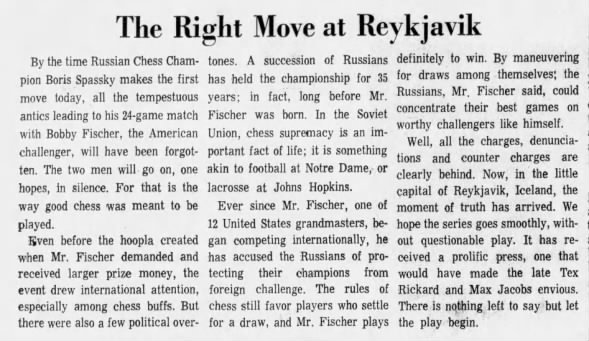 The Right Move at Reykjavik 11 Jul 1972, Tue The Baltimore Sun (Baltimore, Maryland) Newspapers.com
The Right Move at Reykjavik 11 Jul 1972, Tue The Baltimore Sun (Baltimore, Maryland) Newspapers.com
Wisconsin State Journal Madison, Wisconsin Tuesday, July 11, 1972 - Page 29
Let's Hear It For Fischer!
Today we present our semi-annual awards for exceptional performances in the field of athletic endeavor, or imagination in the art of making a buck.
United States chess master Bobby Fischer walked off with our two most prestigious citations.
First, Bobby gets the P.T. Barnum Tub-Thumping Trophy for superb advance work in publicizing his world championship match against Boris Spassky. ([He didn't need to. The Soviets were so busy putting their worldwide network of saboteurs into motion unleashing vitriolic Pro-Soviet attacks, it was all the “publicity” Fischer could handle.])
Fischer maneuvered the news media with sophistication ([again, the Soviets were responsible, for if it had been Fischer, the reports would've been glorifying Chess and speaking plain facts about Fischer, because he cared about gaining the respect, and support of his fellow Americans for Chess, and himself]) reminiscent of Barnum, who gave the world Gen. Tom Thumb, reputed to be the shortest man since Napoleon, and until Mickey Rooney. ([Indeed, the Soviets have alleged everything conceivable under the sun up till this point, eroding respectability of Chess in America, equating it with a “Circus” while smearing Fischer's character, in the hopes to turn Fischer's American-support base against him, so when Fischer strikes that death knell on Soviet arrogance, nobody will be watching… at least, the USSR hopes nobody will stick around for their humiliating defeat.])
Fischer induced editors to take chess out of the obituary section, forced the match onto Page 1, ([Fischer is being given far too much credit here for having THAT power and influence over editors, especially ones on the Soviet payroll … and if he did, they would be reporting positive reviews about himself and Chess. No?]) and singlehandedly masterminded a campaign that eventually elevated it to the sports page.
He took chess out of the drawing room and made it the chief topic of conversation in saloons and pizza parlors where the sport attained a stature never dreamed possible in this country. ([That's what happens when Americans AND Soviets have foresight enough to know the Soviet is about to have its *** handed to them…])
Bobby also finished first in competition for the Muhammad Ali Psyche Salute ([Why? Because he stood his ground and didn't let the Soviet bully him with their manipulation tactics and ultimatums and temperamental threats, to “not play” unless the Soviet got its way. Caving to pressure, like Euwe did, forcing the prize money reduced from Australia's bid of $225,000 down to a meager $150,000 to be divided between two men! Now why should Fischer be forced into settling for half his worth?]) presented for the most effective job of destroying an opponent's composure during the first half of 1972. ([The antisemitic, racist, double-tongue Soviet saboteurs had it coming!])
Win or lose, Fischer had Spassky spastic. Officials at a world championship event haven't been that confused since Jack Kerns quit managing prize fighters. ([Those Soviet-Icelandic organizers, were the AUTHORS of all their own confusion. The negative rubbish printed in newspapers, is merely Soviet “damage control.”])
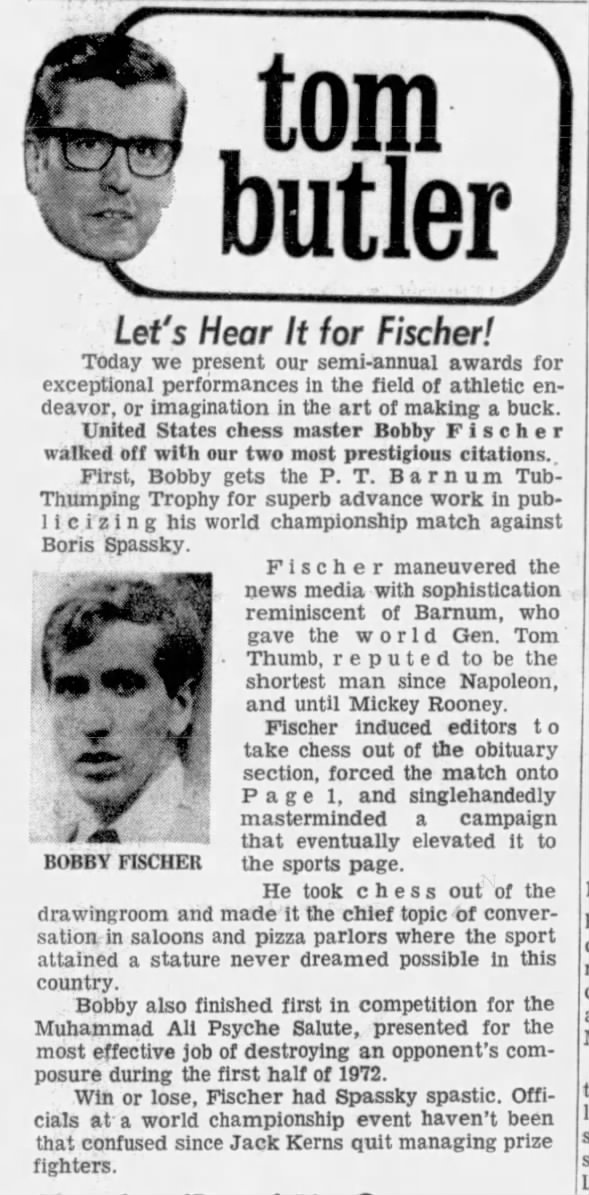 Let's Hear It For Fischer! 11 Jul 1972, Tue Wisconsin State Journal (Madison, Wisconsin) Newspapers.com
Let's Hear It For Fischer! 11 Jul 1972, Tue Wisconsin State Journal (Madison, Wisconsin) Newspapers.com
Orlando Evening Star Orlando, Florida Tuesday, July 11, 1972 - Page 32
How Did Iceland Get The Match? by Melvin Durslag
Los Angeles — The first question to be asked is how Iceland put the gaff on the World Chess Championship. ([Easy answer: Soviet strong-arm tactics! and their worldwide network of saboteurs are putting the “hush” on the fact it has one of the longest histories in the world of being staunchly Pro-Soviet, Anti-American, and Racism that would make Hitler blush with pride. Not a word mentioned in American papers that Iceland's professional class sympathized with the Nazi regime during the WWII era.])
Only about a fourth of the country is habitable, and the population runs less than a quarter-of-a-million.
When Icelandic committee men made their presentation before the chess league, did they promise to black out Reykjavik?
“Will boat-rockers bring suit, demanding the match be shown locally on TV?” they doubtless were asked.
“WE CAN ASSURE you the blackout will be enforced,” they answered. “And the biggest paper in town, the Daily Dagbladet-Thingevellum, has promised not to run a story asking who needs the title chess match in Reykjavik.”
“But certainly some politician will ask for an injunction,” they were reminded.
“The herring run at that time of year,” the committee men replied. “All our city councilmen will be working the nets.”
“That's what the National Football League was promised by Los Angeles when awarding the Super Bowl game. And, sure as heck, a politician escaped and demanded the show be televised locally.”
“REYKJAVIK isn't Los Angeles,” the committee answered. “We are organized. And our central location in the North Atlantic, south of the Arctic Circle, will make transportation simple for everyone.”
The official purse, as you know, is $125,000, which would seem a bit excessive for the energy expended except that a British millionaire added another $125,000 to the kitty.
Anyone pursuing such a purse should be asked to go a mile and a quarter.
I mean, when Riva Ridge finds out that guys earn that much sitting on their can, he is going to demand that the Santa Anita Handicap hike its ante to $500,000. ([but he should do his quarter and a mile, hike, while playing Bobby Fischer at chess. Put his mental acumen to the test, first.])
You never cease to be pained by life's injustices. At the time Bobby Fischer was holding out for colossal sums in Iceland ([he could've settled for Australia, who made the colossal bid for $225,000, with only 25 grand going for organization expenses. Seems the Icelanders are either inefficient and bad accountants, or have problems with simple arithmetic.]) a collection of horseplayers boarded their bus in Baltimore, bound for Delaware Park.
SCARCELY OUT OF THE city, they were confronted by two guys with guns who robbed them of all their money.
Tragedy has befallen horseplayers for centuries, but never had they gone broke before the first race.
Presumably, the first to protest the stickup was the track, which informed the robbers that they owed Delaware Park 16 per cent, the normal take-out.
“We oppose highwaymen for the same reason we oppose bookmakers,” the track accounted. “Both bilk us out of our pari-mutuel cut.”
If the players had been ravaged by flood, the track, in all likelihood, would have provided from them in the infield.
But victims of a mere holdup, they were left to forage for themselves. If bandits will take money from a horseplayer, they are 2-5 next time to rob an orphanage.
Bobby's Record Not So Good
INSPECTING THE record of Bobby Fischer against the defending champion, Boris Spassky of the Soviet Union, you are hard-pressed to understand how Fischer was able to make such firm demands.
In five matches with Boris, Bobby is 0-3-2. With that kind of history, a challenger in boxing is lucky to get 12½ per cent.
As you doubtless know, ABC has arranged to televise part of the championship. It isn't easy to do chess. The game moves with such speed that you have trouble setting up your TV time-outs.
Instead of selling 30-second spots, you never offer a sponsor less than an hour for a commercial during chess.
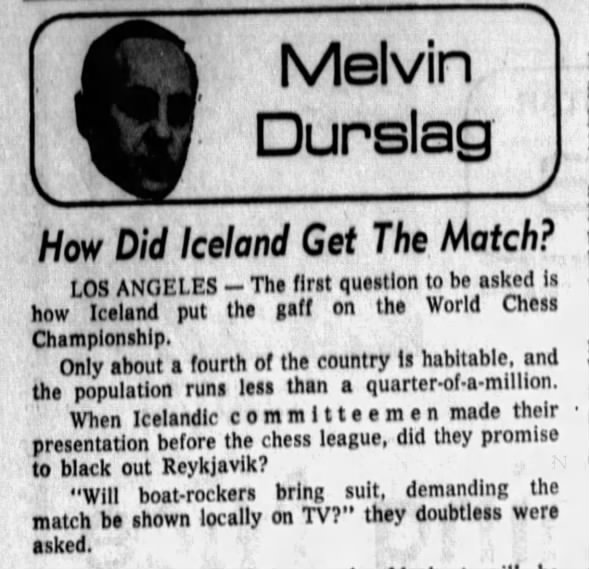 How Did Iceland Get The Match? 11 Jul 1972, Tue Orlando Evening Star (Orlando, Florida) Newspapers.com
How Did Iceland Get The Match? 11 Jul 1972, Tue Orlando Evening Star (Orlando, Florida) Newspapers.com
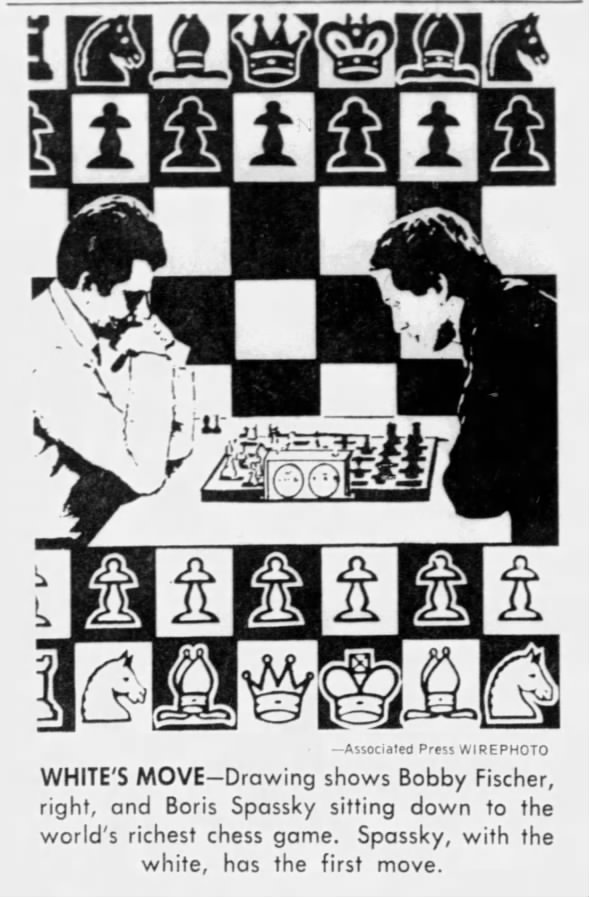 White's Move - Drawing Shows Bobby Fischer, Right, and Boris Spassky 11 Jul 1972, Tue Press and Sun-Bulletin (Binghamton, New York) Newspapers.com
White's Move - Drawing Shows Bobby Fischer, Right, and Boris Spassky 11 Jul 1972, Tue Press and Sun-Bulletin (Binghamton, New York) Newspapers.com
The Daily Capital News Jefferson City, Missouri Tuesday, July 11, 1972 - Page 4
Breathless Chess Match
The on-again, off-again, on again international chess match has left us a little breathless awaiting its ultimate outcome.
Throughout the preliminary ballyhoo, the ([protest and boycotting]) of American challenger ([over multiple Soviet offenses, ploys and manipulative off-the-board tactics]), Bobby Fischer, have been making headlines on an almost daily basis.
We suggest that television get “into the act” and carry the matches “live” from Iceland. Like they did during the Peking and Moscow Summit meetings, the TV network cameras could zero in on the people clearing the streets of Iceland or performing other mundane tasks. Sometimes it requires long intervals between moves on the chess board.
It's possible the “excitement” of these matches and the Icelandic scenery might liven up an otherwise dull summer TV season.
Ignoring Grim Fact
Earlier this year, William Randolph Hearst, Jr., editor in chief of the Hearst Newspapers, returned from a fact-finding trip around the world. Here is one of his cogent comments.
“It is a bit disturbing to get home and realize how many Americans fail to face one of the grimmest facts there is — that Communism(TM) ([pseudo-militarist, Industrialist-based pseudo-Socialism]) keeps working day and night to destroy freedom wherever it exists. The next time somebody tells you that Soviet “Socialism” is nothing to worry about, you can be sure of one of two things. Either he hasn't got all his marbles or he is quite far left ([and duped by big industrial propaganda which buried millions of Socialists under the Empires of Lenin/Stalin and Hitler, America tossed them out, and rounded them up in the McCarthy era... even accused civil rights activist Martin Luther King of being a USSR-Bolshevik, Soviet agent... poor man was attacked by a black woman, who jabbed him through with a letter opener, frightened out of her wits over what big industry was calling “Communism”… FAKE communism. Drive the poorest and most helpless people, miles away from a movement whose aim was to lift them out of poverty, that's what the industrialists achieved. FAKE Socialism in Moscow —]) of center politically and ideologically.”
The grave tragedy is that leftists and liberals, ([having it erased from memory what true Socialism was about; human rights, civil rights, minimum wage, standards for worker safety, et cetera… and being indoctrinated “Communism” supposedly is represented by big Empires, with big armies, bulldozing over human lives as they ignite war after war after war]), including some of our largest news media, wittingly or unwittingly, continue to lull Americans to sleep about the dangers of ([Pseudo]) communism.
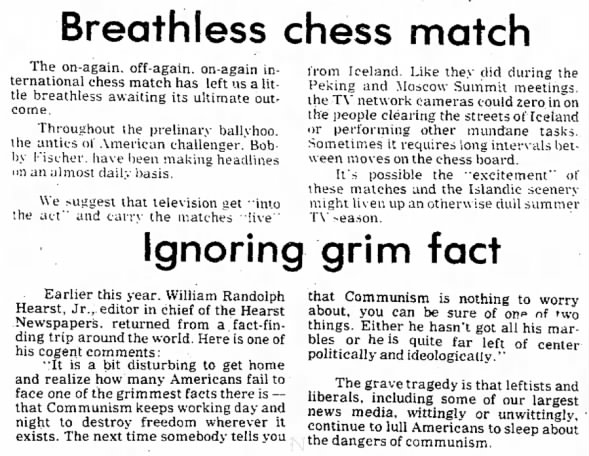 Breathless Chess Match 11 Jul 1972, Tue The Daily Capital News (Jefferson City, Missouri) Newspapers.com
Breathless Chess Match 11 Jul 1972, Tue The Daily Capital News (Jefferson City, Missouri) Newspapers.com
The Boston Globe Boston, Massachusetts Tuesday, July 11, 1972 - Page 2
Spassky's Taxable Winnings
Q — If the Russian Spassky wins the chess championship of the world when he plays against the American Fischer, how much of the prize money will he be allowed to keep? — M.A. Belmont.
A — Boris Spassky goes into the match as world champion. If he keeps the title, he will be a rich Russian. The winner's share of the prize is $100,000. If Spassky wins, he will pay an income tax of $1300 — 13 percent. If Fischer wins he is liable for an income tax of $53,000 — roughly 53 percent.
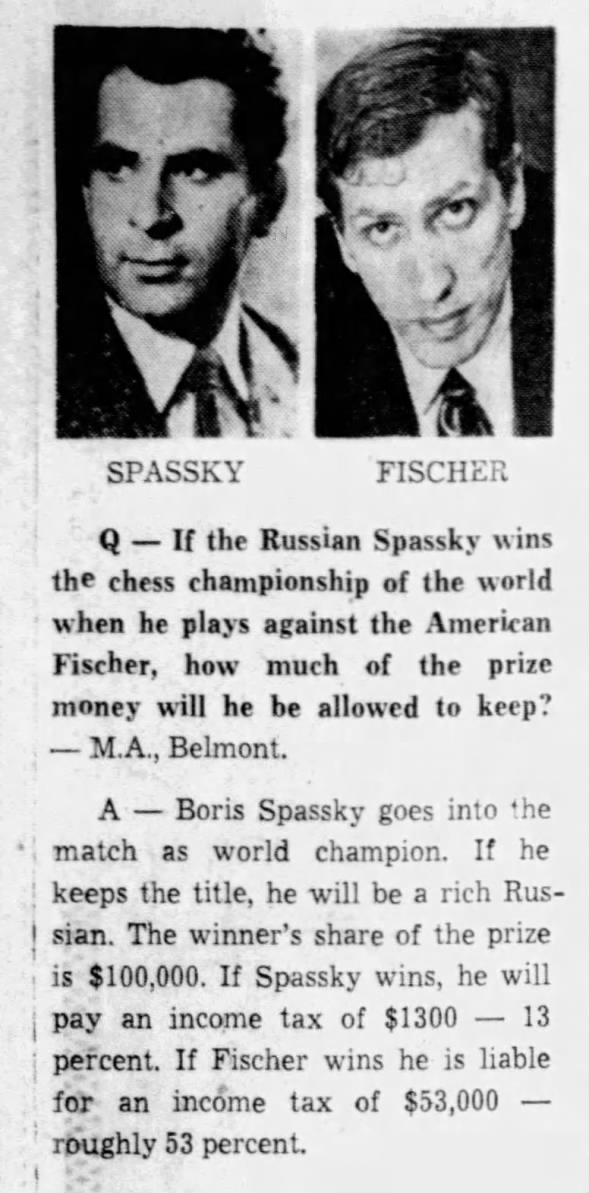 Spassky Winnings 11 Jul 1972, Tue The Boston Globe (Boston, Massachusetts) Newspapers.com
Spassky Winnings 11 Jul 1972, Tue The Boston Globe (Boston, Massachusetts) Newspapers.com
The Argus Moline, Illinois Tuesday, July 11, 1972 - Page 18
Popularity of Tennis
The popularity of the sport hasn't been damaged in recent weeks by complimentary remarks from stars in other fields.
Jack Nicklaus, considered the world's premiere golfer, recently told a writer that when he gets up-tight, he plays tennis to relax. “I wouldn't play golf if I didn't get paid,” he said, “but I'd play tennis.”
Chess master Bobby Fischer, interviewed the other day in Reykjavik, Iceland, site of the marathon world championship chess tournament against Russian world champion Boris Spassky, lamented that the small town had only two tennis courts. Where, he wondered, was he going to unwind from the rigors of the match?
The tennis boom is most accurately reflected locally by the sales of tennis equipment, and not just rackets and balls.
“My sales are up considerably,” said Roy Turner of Rock Island Sport Shop, “particularly in the area of clothes. Until the past couple of years nobody was interested in buying tennis shorts or shirts…or even hats.
“A player figured all he or she needed was a racket, a can of balls and tennis shoes. But now the whole line of tennis equipment is going big.”
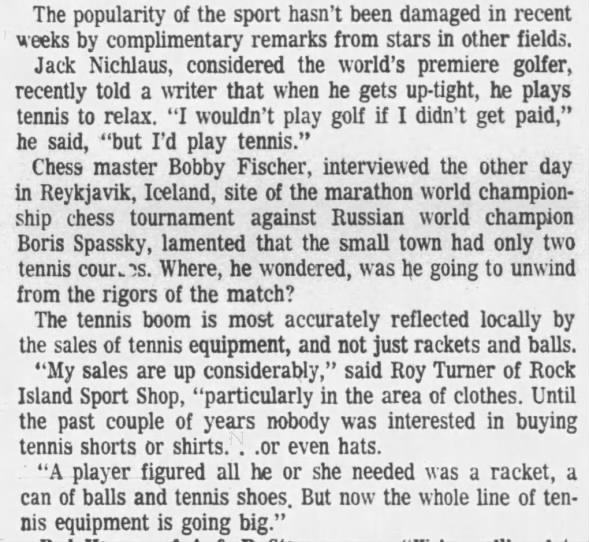 Popularity of Tennis 11 Jul 1972, Tue The Rock Island Argus (Moline, Illinois) Newspapers.com
Popularity of Tennis 11 Jul 1972, Tue The Rock Island Argus (Moline, Illinois) Newspapers.com














